
Why Is Market Research Important: We Give You 7 Reasons

Planning and conducting market research is a critical component of any business. It provides decision-makers with important information to decide the course of the company, launch a new product, or to keep a tab on what competitors are doing.
Data indicates that market research is a growing industry of 47.36bn USD , globally – and rightly so. For a business to succeed, all its resources – financial and otherwise – must be invested in areas where they are needed the most. Conducting market research helps you identify those areas. It also helps you discover and understand your customers’ needs so you can innovate better, expand when the time is right, and work with more focus.
In this article below, we will share a few pointers with you about why market research is important for every business – big and small. But first, let’s talk about the types of market research.
Types Of Market Research
Depending on the purpose of your research, you can choose either of the two main types of market research. These are primary research and secondary research.
– Primary Research
Primary research is direct research that you conduct yourself or hire someone else to do it for you. It involves reaching out to your target market, asking them questions, collecting data, and analyzing the information gathered. Based on the data, strategies are devised, decisions are made, and policies are created.
Primary research helps you explore issues, dig deeper, and ask specific questions that are relevant to research topics or what you are looking for. Because it takes more time and effort, it may also cost a bit more than secondary research but it is more effective and helps you gain a solid picture of what’s going on.
– Secondary Research
Secondary research is using somebody else’s primary research for your business purposes. Research that is already conducted, organized, and published is often used by small businesses to gauge market trends, current economies, and to devise plans.
A lot of government agencies conduct market research for various purposes. If you’re on a budget, going to one of those agencies may help you out a lot as most of that research is freely available to the public. If you want to access a private market research company’s report, you may have to pay a fee to access the complete file.
However, there are private companies that publish their reports publicly. Additionally, you can also go online and conduct Google searches looking for specific phrases relevant to your research purpose to find valuable data.
Why Is It Important?
Now that we know what market research is and what different kinds it has, it’s time to learn why it is important, and why you should invest in it if you want to become a successful entrepreneur.
1. It Helps You Identify The Problem Areas As Well As Strong Areas
Knowing what you are good at and what you’re not, help you take profitable risks in life. It’s true in business too. Accurate market research helps you identify business areas that are performing well, those that need more attention, and also those that you should perhaps give up.
Back in 2010 , two young tech enthusiasts launched a location-based app – Burbn – that would allow consumers to check-in, make plans of hangouts with friends, share pictures, and more. Few weeks into the launch, they realized through internal discussions and reevaluation of the market, that Burbn is cluttered and their target market is more into Foursquare and they won’t be able to budge them.
They took a long, hard look at their app again – which had already been launched – and started working on it from scratch, removing all the features and only letting the photo-sharing, liking, and commenting options intact. And thus, Instagram was born.
It also helps you discover and understand your customers’ needs so you can innovate better, expand when the time is right, and work with more focus. For example, if you plan on starting a digital marketing agency, you’d know that there’s more need for social media in your area, than for PPC services. Thus, you’ll hire more social media experts.
2. It Helps You Understand Your Customers’ Needs
It is not enough that you know your business; you got to know what your customers are saying about you – and about your competitors. If you have got your pulse on what your customer is thinking, you’d create products that solve their issues, reach out to them when they are most ready to listen, and help them become your loyal ambassadors.
A huge part of business market research is always dedicated to gauging customer satisfaction rates, their reactions to a new product, and what they are looking for next.
In 2005, when YouTube initially launched, it was for a very different purpose : dating. Pretty soon into launch, however, and by investing in robust market research (a part of which they conducted themselves) the founders realized that their video dating app is not what their customers are looking for. Analyzing the data, they discovered that there is no app or platform in the market for video sharing. The websites that were offering this service were patchy at best and not intuitive at all.
Being attuned to their customers’ needs and spotting a wide space in the market, they tweaked their video platform and launched YouTube .
Following what your customers are talking about, listening to them, and then delivering on their needs is an important task that you can fulfill with timely customer-centered market research.
3. Helps You Conduct Your Marketing Based On Informed Decisions
Launching and running a business means making decisions every day – about products, services, expansions, HR, and so much more. Without solid market research backing your decisions, all you are doing is guess-work, hoping the results will be in your favor.
With research helping your business, you are better informed about areas to invest in, gauge the potential success of new products, test new markets to expand into, and to determine what kinds of products/services will be most favored by your customers.
This is certainly what Starbucks does. The company has a whole dedicated platform ‘My Starbucks Idea’ where employees and customers and anyone who wants can pitch in and share what they think the company should do next, the flavors it should try, the new products it should launch, bring back some old favorites, and more.
The platform helps them remain informed on all important aspects of business investment and propels them towards ventures and venues that hold the most potential.
If you aren’t a humungous company like Starbucks and cannot afford to host dedicated platforms to gain important information, invest in market research whenever you have a big decision coming up. It isn’t as expensive as you think and doesn’t take that much time. Plus the results can be relevant for a lot of related areas that you may want information on.
4. Helps You Keep An Eye On Your Competitors
As a startup founder, you may think being original is all about being focused on what you’re doing and not worry about what everyone else may be up to. This approach spells long-term disaster. While you should certainly keep your focus on your own efforts, it is critical – and smart – to keep tabs on your rivals and know what they are thinking or planning.
With sound market research on your side, you can better prepare for what your competitor may be about to do next and make sure they aren’t able to put a dent in your market share. With regular research, you can not only learn to anticipate their next move but be in a better position to avert any possible damage from their end.
In addition to conducting market research, you can pair it up with regularly monitoring their social media or to increase Instagram followers , blog posts, and seeing what is trending in your market. Here is a great resource on how you can go about it.
5. Helps You Expand And Innovate
Market research can help you identify markets and geographical areas where you can expand to. It can also help you to invest in ideas that have the most potential to succeed based on what customers are looking for and what the market is lacking.
For example, if you are a retail company, conducting market research can help you identify locations where your store can profit the most. If you are planning to buy a business to increase your market share, market research can help you point towards businesses that may be ripe for acquiring. Not only that, conducting market research before you launch your business can help you figure out ways to put your best foot forward.
It guides you towards opportunities where you have the most room to innovate and take risks with the highest return potential. For example, if your competition is employing cutting edge tech such as VoIP Phone to get better results, you can also employ the same to improve your customer care and business goals.
6. Helps You Set Business Goals
Goal-setting is one of the major parts of running a business – big and small. Goals give you directions, help you remain in sight of the bigger picture, and set you on the path of continued success. Goals can be of different kinds: short-term, long-term, department-oriented, over-arching, and such.
To set all these kinds of goals and get ready to meet them, businesses need to have a thorough and complete knowledge of their strengths and weaknesses. They need to be aware of how the market is behaving and predict what may come next.
All of this is only possible after conducting market research. With the help of focused market research, you can set achievable business goals and not follow some vague notions of instant success. These often include how to improve productivity, customer satisfaction, and business’ financial health. You can also use market research to learn ways you can reduce expenses without hurting the business, find out how to amplify your digital marketing, generate copywriting tips for research paper writers , or introduce a new employee incentive program.
7. Helps You Know Which Risks To Take And Increases Earning Potential
Risk-taking is an important component of the business. Without it, you can become stagnant and a sitting-duck for a more ambitious rival. But risk-taking cannot be a shot in the dark. To know which risks to take and when to take the plunge are attributes of successful innovators. From Dropbox’s Drew Houston who refused Steve Jobs to Google’s buying of YouTube when it was a fledgling startup, the history of business success and innovating is packed full of stories of ambitious – but informed – risk-taking.
Using market research and building a strong investing network , you can also join the ranks of informed-decision makers who do not shy away from taking risks. It prevents you from making costly mistakes that could have been avoided and take steps that result in massive profits.
Take the example of Frito-Lay . When the potato chip maker wanted to introduce a new brand, it launched online market research conducted through Facebook to ask its customer-base which flavor they would like the best. The results showed that beer-battered onion-ring flavor is a hit in California and Ohio, while New Yorkers preferred the Churros flavor idea. This research also helped him increase Instagram followers as his posts became popular over the internet.
The research helped the company come up with different flavors and market them strategically to different states. If the research would not have been done, the company would have come up with a new flavor that could have been a hit – or a miss.
Popular Instruments Of Market Research
As technology keeps advancing, market research keeps evolving. Where before you had to rely on face-to-face interviews, telephone surveys, or lengthy online questionnaires, now it’s all about short online surveys, online video interviewing tools , instant case studies aided by technologies, and focused groups that are already available on your social media channels.
Below we talk about 4 popular instruments of market research that are frequently used by companies worldwide with excellent results.
– Surveys
The survey is a quantitative method of research which means it gives you numerical scores. These scores pertain to specific answers and don’t leave much room for multiple interpretations. Because they are precise, provide specific answers, and immediate interpretation, quantitative methods are popular to conduct research when you are looking for exact information: to find out how to solve a particular problem, etc.
According to a study conducted by Statista.com , 26% of all market research is conducted through online quantitative methods, with online surveys accounting for a major share of 79%.
If you know how to create an easy survey online for your company, here is a great resource to get you started.
– Case Studies
Case studies are usually qualitative research methods; however, you can incorporate a mixed approach with a quantitative questionnaire thrown in for additional information. Using case studies, you focus on a single individual or single entity to research them thoroughly. The purpose of using case studies in business market research is usually to test theories of what went wrong in a particular situation or what went right.
Case studies are time-taking but provide extremely valuable information, detailed data, and in-depth analysis opportunities.
– Focus Groups
Focus groups are another popular instrument to conduct market research in business. A focus group consists of a small portion of your target audience that you can study in detail. It is a qualitative method of research and allows you to bring together a group of individuals that can take part in a guided form of discussion.
You can give them one or more focus questions that the group can talk about and share their views on. Focus groups are great to use when you’re creating a new product, researching a particular market segment, or want to know what your customers are thinking about you or your market.
Similar to case studies, focus groups give you a comprehensive view of a situation and allow you to conduct an in-depth analysis of different business elements.

The Future Of Market Research
The future of market research is bright. As a budding and burgeoning industry, it shows all the trends of continued growth. But as technology becomes more accessible and mobile devices more popular than desktops, market research is also evolving to fulfill the shifting customer needs.
The surveys are becoming shorter as nobody has got the time or interest to fill out a 10-page questionnaire. Artificial Intelligence is making the data collection process quicker and more intuitive, including contact database . And as time passes, you’ll see more and more market surveys being optimized for mobile.
So use all that modern market research has to offer you and use it to propel your business for the success you’d always dreamed of.
Embed this Infographic on your site using the html below:
<br /><a href="https://www.surveycrest.com/blog/why-market-research-is-important/"><br /><img src="https://www.surveycrest.com/blog/wp-content/uploads/2020/06/Market-Research-Trends.png" title="[INFOGRAPHIC] Why Is Market Research Important: We Give You 7 Reasons" alt="[INFOGRAPHIC] Why Is Market Research Important: We Give You 7 Reasons" border="0" /><br /></a></p> by <a href="https://www.surveycrest.com/">Surveycrest.com</a><br />
« Re-Imagine Marketing Strategy To Ensure Your Business Thrives Even In The Lockdown
Why mental health surveys are important during the covid-19 pandemic ».
About The Author Kelvin Stiles
Kelvin Stiles is a tech enthusiast and works as a marketing consultant at SurveyCrest – FREE online survey software and publishing tools for academic and business use. He is also an avid blogger and a comic book fanatic.
- How it Works
- Survey Templates
- Terms and Conditions
- Privacy Policy
Copyright © 2024 SurveyCrest.com
Don't have an account? Register Here
Already have an account? Sign in Here
Forgot Password
To reset your password please enter username or email below and press reset button.
OR login using a social network account
- --> Login with Facebook
- Login with Facebook
- --> Sign in with Google
Why Market Research Is Important

7. Stay on Top of Trends

A consumer sees an ad for a product that seems perfect for them and rejoices over their luck, but this scenario likely didn’t (and shouldn’t) come down to luck. Companies make these scenarios possible through strategic market research. Equipped with valuable information about its target market, a company can develop products and create marketing campaigns that appeal directly to consumers. And the benefits don’t stop there. You can leverage the data procured through market research to propel your company to success in a variety of ways.
We’ll break down the basics of market research below to show how companies use it and explore some of the key benefits. If you’re not taking full advantage of market research to make data-driven decisions, you should start considering the ways it could help your company grow.
What Is Market Research in Business?
Market research involves gathering data to learn more about target demographics and consumers so a business can market itself more effectively and, ultimately, succeed in the market. Market research is a vital part of any business strategy, whether that business is B2B or B2C, big or small, new or old. It provides the answers companies need to make decisions that will move them forward instead of back by empowering them to base decisions on data.
Most companies know what market research is and acknowledge its importance in a general sense, but they may not realize just how crucial market research is to the success of their business. When you need to identify market trends, understand your core customer better, or achieve a long list of other important goals, market research is the answer.

Types of Market Research
Market research is a broad category. In fact, there are many varieties of market research that you can use to meet the specific goals of your business. Below, we’ll explore the different benefits of each type of market research.
- Brand research: Brand research is focused on creating or refining your company brand to make a bold and favorable impression on your target market. You could look into the level of brand awareness among your target audience, how loyal customers are to your brand, what sorts of qualities people associate with your brand, and other aspects of customers’ relationship with your brand.
- Marketing campaign evaluation: Some market research focuses specifically on marketing campaign effectiveness . You can evaluate how many people have seen your online ads and what the click-through rate has been, for example. This type of information can help you make adjustments if needed and inform future campaigns so you reach consumers effectively and keep customer-acquisition costs down.
- Competitor research: Competitor research focuses on the competition to help you gain insights into how your company can pull ahead. Looking into a competitor’s marketing campaigns, brand reputation, revenue or sales volume, and other important data points can help you learn from their strengths and weaknesses.
- Customer segmentation research: An important type of market research, especially for new businesses, is customer segmentation. These studies divide your larger consumer base into different groups or personas. Understanding the different types of consumers you want to connect with can help you create individualized campaigns tailored for each group.
- Consumer research: Nearly all market research involves the consumer in some fashion, but some research is focused specifically on understanding consumers within a certain segment better. You may want to learn about their purchasing habits, interests, motivations, and more. The better you understand your consumers, the more effectively you can appeal to them.
- Product development: Developing products calls for market research first to ensure the concept has value and then to refine the product over time. For example, you may see sales dipping on a flagship product and discover that customers’ needs have shifted and this product should offer a new feature to be more useful or convenient.
- Usability testing: Similar to product development research, usability testing is focused on products. However, the focus here is on how consumers use your product. You may release a beta version of your mobile app, for example, and get feedback from users to find out if there are any bugs or other problems you need to work out.
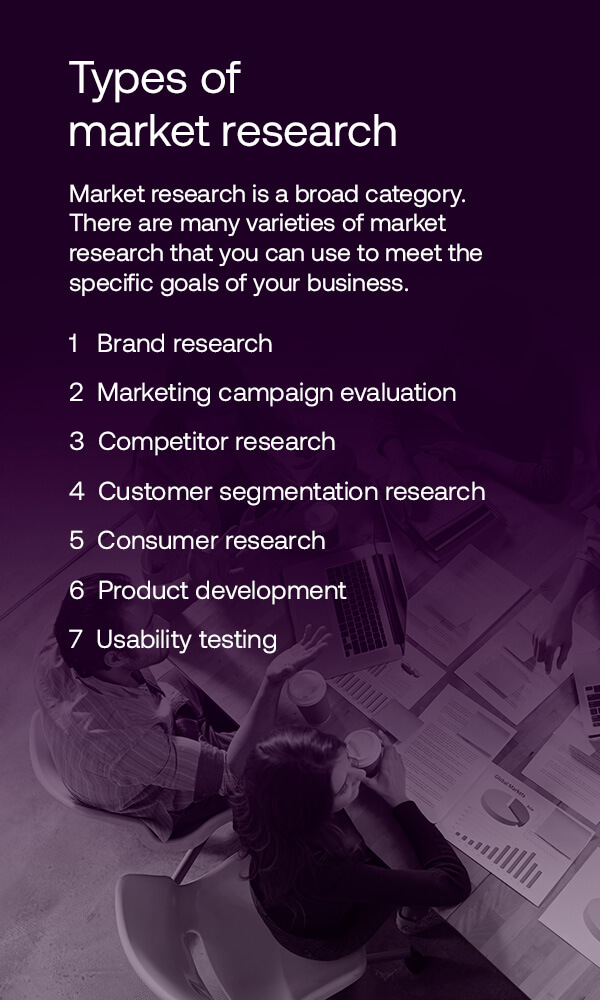
The Benefits of Market Research
Market research can deliver valuable benefits to companies like yours. Let’s look at some of the most impactful ways market research can empower your company to succeed.
1. Maintain a Customer-Centric Approach
Market research is all about understanding your consumer base better, and that is an essential step to creating a customer-centric business. Customer-centric companies keep the customer experience at the forefront of all they do. Research has shown that customer-centric businesses are 60% more profitable . It’s easy to see why prioritizing the customer’s needs and desires is a recipe for success.
Market research is how you come to understand those needs and desires in the first place, along with other important aspects of your target customers. You can’t effectively build a customer-centric business unless you understand your customers. Conducting market research allows you to appeal more specifically to your customers’ pain points and preferences. It’s a win-win for your customers and your business.
One of the most effective ways to be customer-centric in your market research is by using a segmentation-targeting-positioning (STP) model. This marketing model involves:
- Segmentation: Brainstorm the possible segments your product or service may appeal to. These segments can be defined geographically, demographically, or otherwise.
- Targeting: Determine which segment or segments offer the most profitable opportunities for your company so you can focus on marketing to these segments.
- Positioning: Develop a strategy for addressing your target segment’s needs and do it better than your competitors. You can also consider the best way to promote your solution to the target segment.

2. Connect With Your Audience More Effectively
When you understand your target customers better, that means you’ll be able to more effectively reach them. When it comes to your marketing campaign, you don’t want to waste time and money on trial and error — you want to have an informed marketing strategy. There are two main elements of effectively connecting with your audience: the marketing channels you use and the content you share.
Using a one-size-fits-all approach, regardless of your audience, can be a costly mistake when it comes to marketing channels. The print publications your audience reads, the television shows they watch, and the websites they spend time on can dramatically differ from those of the target audience for your last product.
For instance, you can reach close to half of the urban population by advertising or marketing on Instagram, but you’ll only reach approximately a fifth of the rural population this way. So advertising your farm equipment on Instagram is likely a poor choice.
Choosing the right marketing channels is an important first step to reach your audience, but to truly connect with them, you also need to tailor the content of your marketing materials. Everything from the features of your product you advertise to the tone and visuals you use should be crafted to speak to your target audience. When customers feel you’re “speaking their language,” they’re more likely to pay attention to what you have to say.
3. Identify Opportunities for Growth
Market research isn’t just an important step for new companies or companies launching new products. Conducting market research periodically can help you discover new opportunities to improve and grow. For example, you may discover:
- Unreached segments: You may come across unreached segments that, like your current customers, could benefit from your products or services. Perhaps they just don’t know about your brand yet, or they think your products are intended for someone else. This segment could be consumers of a different age, gender, income level, or geographical region, for example. A simple modification in your product or marketing strategy may be all it takes to unlock a whole new customer base.
- Business partnerships: Through market research, you may also discover opportunities to partner with other businesses that already have an established connection with your target audience. Joint promotions can be mutually beneficial for you and the partner company. Essentially, you can combine the power of both your brands to expand and strengthen your reach.
- Product improvements: Market research can reveal possible shortcomings in your product or services that, if remedied, would allow you to appeal to more customers and improve customer satisfaction. You may also discover opportunities for add-ons, product bundles, or other upsells that appeal to customers’ preferences and help you increase profits.
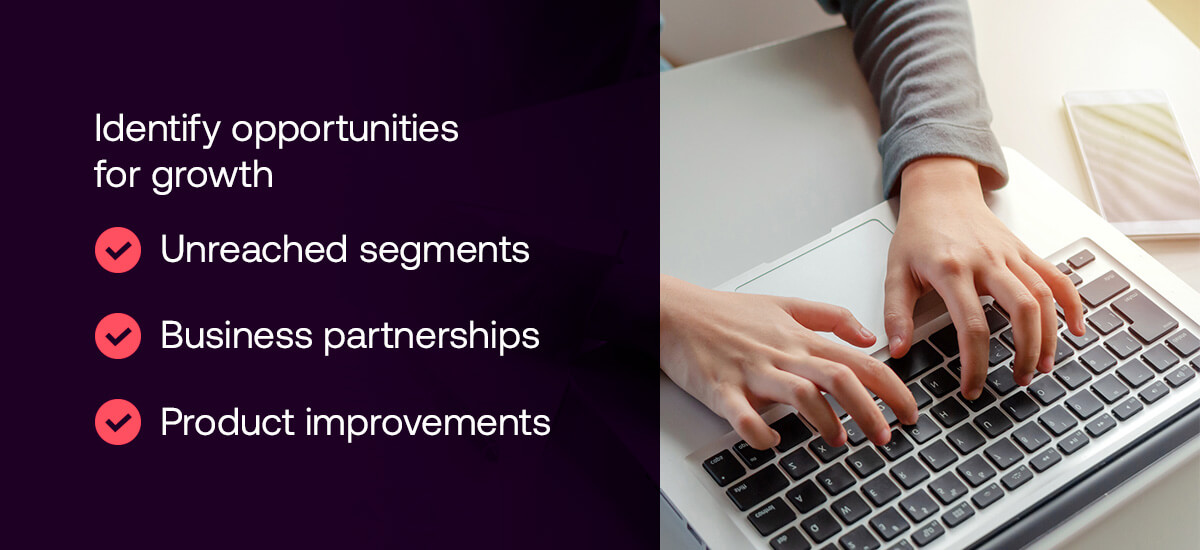
4. Reduce Risks by Testing Concepts
Risk is a necessary part of any business venture. If businesses didn’t take on risks, they would also limit the potential for reward. However, successful businesses tend to mitigate their risks in strategic ways. The way to avoid risk is not to avoid doing anything. Instead, businesses should use market research to minimize risks and maximize rewards.
A major way you can minimize risks is by ensuring there’s demand for a product. The reality is that many products fail. Some experts place the failure rate as high as 95% . While that estimate is likely too high, it remains true that many new products fail to connect with consumers and end up in clearance bins. One study found that, of the 9,000 new products that were broadly distributed at a national retailer, 60% were no longer sold within three years.
Because of the high risk involved, you should never create a product based on a mere hunch. Use thorough market research to predict whether a product concept has real potential for success. Will your product meet a need or desire your customers have, and will it do so more effectively than your competitors are doing? When you have proof of concept, you can be more confident in your efforts and more effectively attract investors.
After you’ve created your product, whether it’s a prototype or a limited run, you can employ market research again to help you refine your strategy before an official product launch. For example, you could give samples of a new food product to passersby in exchange for their feedback. You can also use market research to test reactions to a new logo, new packaging, or any number of other business decisions.

5. Make More Informed Decisions
Market research empowers companies to make more informed decisions that are backed by data. Gut feelings are not reliable means of making decisions. For instance, you may think releasing a luxury version of your product at a higher price point is a great business idea, but consumers willing to pay that price may associate your brand with budget-friendly products and opt for luxury products from luxury brands instead. The only way to know for sure is to conduct market research.
Market research data can serve as a compass, steering each choice a company makes to take them one step closer to their goal of successfully converting and retaining their target customers.
Here are some examples of decisions you can make more accurately with the help of market research:
- Choosing a different consumer base to target through a new marketing campaign
- Determining which channels to include in your advertising campaign
- Selecting design and personality elements to form a brand persona that will connect with your audience
- Choosing whether to open a new retail location
- Deciding whether a product should be discontinued or modified
- Pricing products in a way that maintains margins and appeals to customers
Through market research, you can make these and other decisions based on data rather than guesses and, as a result, boost your chances of getting it right the first time.
6. Compete More Effectively
Solid market research can be the difference that gives you a competitive edge in the marketplace. For one, by understanding your customers better, you may be able to engage them more effectively than your competitor is doing. Additionally, competitor research can give you direct insight into your competitors so you can understand how you fit into the marketplace.
If you’re a newcomer and want to know the best ways to draw customers away from legacy brands, market research can help you find out where consumers are dissatisfied with these brands and their offerings. By pinpointing these gaps, you can appeal directly to consumers’ desires and market yourself as a disruptive company with a superior solution.
You can also use market research to help you discover underserved segments of the market. By targeting these underserved consumers, you can carve out a place in the market for yourself where you’ll excel. For example, the founder of War Paint, a cosmetic company marketed to men, said, “Growing up, I never felt there was a brand for me, that spoke to me.” War Paint and some other emerging cosmetic brands target male consumers who were previously not part of the equation in the makeup market.

Market research isn’t just important for new businesses. As consumers evolve, companies must also evolve to optimize the way they connect with customers. Market research is a valuable means of staying up on relevant trends. Researching trends can often be done through secondary research. Industry reports or research from your competitors, for example, can reveal what new product features consumers are interested in.
Today’s culture changes rapidly, and market research is essential if you want to keep up. You need to stay aware of trends regarding your consumers’ purchasing behavior, the most popular advertising channels, packaging preferences, product features, relevant messaging, and much more. Mimicking what your competitor did last year isn’t a good strategy.
Trends are especially important and cycle more frequently in some industries, such as fashion and design. If your company sells light fixtures, for example, you need to conduct research frequently to see what styles appeal to modern interior designers and homeowners. You also need to be aware of any new technology you can incorporate into your product to help you stay at the cutting edge and deliver the latest and greatest products to your consumers.

How to Conduct Market Research
Companies can conduct market research through various means. First, it’s helpful to understand the difference between two main categories of sourcing market research data — primary and secondary research:
- Primary research is the data a company collects or an expert collects on the company’s behalf for their market research purposes. In other words, it’s field research. Some primary research is exploratory, meaning it’s more open-ended, and other forms of primary research aim to provide insight into specific questions or issues.
- Secondary research involves using data that already exists and is at your disposal for market research purposes. For example, you could consult government census data, industry data reports or statistics on market trends. This type of research can provide a good starting point for understanding the market more broadly and learning about the competition.
Secondary research tends to be a starting point before conducting primary research.
There are several methods of primary research companies use to learn from consumers. Some of the most popular methods include:
- Surveys: Surveys involve asking consumers questions they can quickly answer. Survey questions can be multiple choice or more open-ended. Surveys can be conducted in-person, over the phone, through the mail or online . They provide a fast and simple way of reaching a large audience and getting their feedback.
- Focus groups: Focus groups tend not to involve as many participants as a survey. Instead, a market researcher leads a small group of consumers in a discussion to get a window into consumers’ thoughts. Because the groups are small, most companies will assemble multiple focus groups and take all the results into account. They may observe through a one-way mirror or watch a recording.
- Interviews: Interviews are similar to focus groups but may involve even fewer people. A one-on-one interview can be a valuable way of gaining detailed insight from one customer. These insights can be helpful, but they don’t provide statistically reliable data as you can get with a large survey.
- Observation: Market observation involves watching consumers to see how they behave under natural conditions, such as a retail store. These consumers may or may not know they are being observed. For example, researchers may watch security footage taken from a store to see which departments customers tend to go to first and whether they stop to look at point-of-purchase displays.
- Field trials: Field trials involve making a business move but doing so on a smaller scale and observing the results. For example, a restaurant chain may try a new menu item at a handful of locations and see how popular it is. If it’s a success, the company can feel more confident about adding the item to their menus throughout the region.
Companies can conduct their own market research in-house, but many choose to share their goals with a third-party expert who can create a market research strategy and execute it. By outsourcing your market research, you can streamline the process, focus on your core competencies, and receive valuable data from the experts that you can then leverage to drive your business forward.
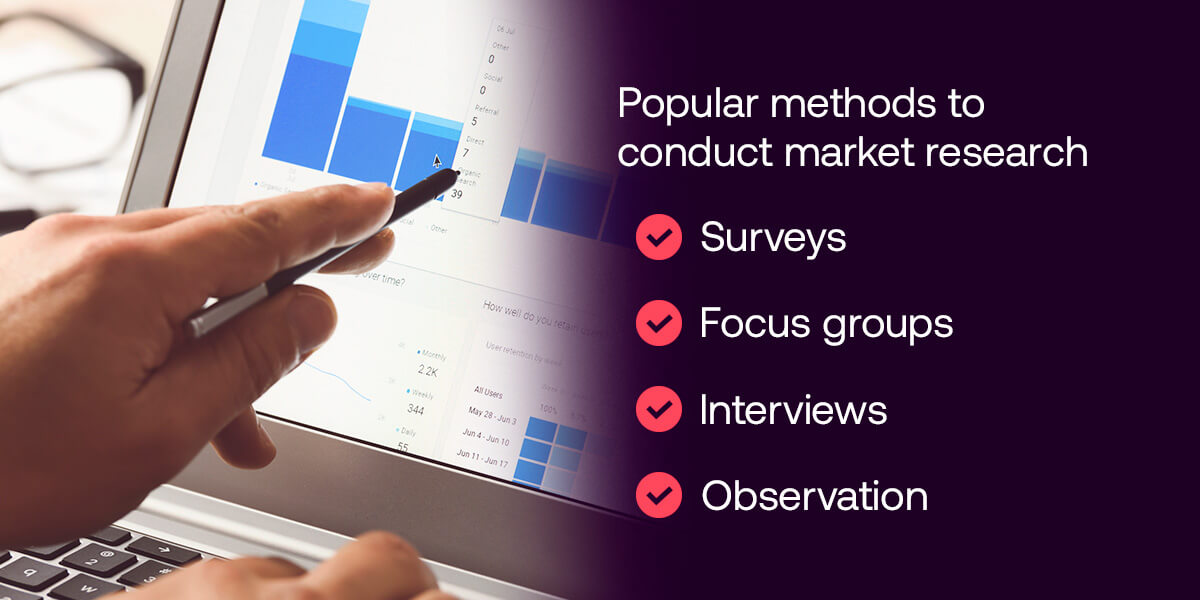
Does Market Research Work?
Market research takes time, effort, and finances to complete, so it makes sense to spend these resources only if you’re going to get a positive return. The reality is that market research remains a crucial part of running a successful business because it is indeed worth the investment. Of course, market research alone won’t cause your business to succeed — but it will give you the information you need to make strategic decisions that will steer your company to success.
We looked at several benefits of market research but consider the inverse reality. Without market research, you could fail to connect with customers, miss out on growth opportunities, be vulnerable to risks, make poor business decisions, and ultimately lose your customers to your competitors. Some businesses get lucky without doing their research, but these instances are rare. Market research can help you avoid common pitfalls and grow your business.
Learn More About Our Market Research Tools
Market research should be a key part of your company’s recipe for success. Surveys are one of the most popular and effective means of reaching consumers and gaining insight into their values, preferences, opinions, and more. At Cint, we help brands and agencies conduct online studies that can empower them with the market research data they need. We can connect your company with millions of consumers, deliver fast results, and ensure those results are accurate through robust quality checks. Cint can help you produce the primary data you need on a tight timetable so you can make informed decisions to help you connect with customers and grow your business. To learn more about our market research tools, contact our team today.

More from our blog

John Lewis tops the tree in the Christmas ads anticipation stakes
The advertising industry’s biggest few weeks of the year are here. What do UK viewers and consumers want from their Xmas ads?

How popular is the poppy in 2024?
Ahead of Remembrance Day, Cint asks whether or not wearing a poppy is still a big deal in the UK.

Get to know our latest tool for brand lift studies: Study Creator
Find the full lowdown on Cint’s Study Creator tool, including the workflow process, benefits, and our latest video tutorial.

Cint Enters a New Era with a Fresh Brand and Platform to Revolutionize Global Research
Cint, the leader in research technology (Restech), is excited to announce a reimagined brand and the latest release of its new research platform, the Cint Exchange.

CintSnap explores US viewing habits ahead of the election
A huge election is also a huge moment for broadcasters. How will Americans be tuning into election night 2024?

TikTok, Deepfakes, and Political Ads: A study on the relationship between media and the upcoming election
Cint and Advertising Week partnered on research looking into the relationship between media influence and voter behavior leading up to this year’s US and UK elections.

Cint Trust Score – Inside the thinking AI brain
Cint’s experts break down the importance of our Trust Score model

CintSnap uncovers US and UK consumer Halloween 2024 spending habits and traditions
We take a look at the difference in spooky, seasonal spending habits and traditions in the US and the UK.

Step into a new era of the Cint brand with us
Find out how the Brand team used visual cues and language to bring the new brand vision to life.

The festive shift: How Diwali is driving India’s digital transformation across four key sectors
From ordering food online to the rise in quick commerce, our comprehensive Diwali survey reveals how technology is reshaping the way people prepare for and celebrate Diwali.

Cint Strengthens Commitment to Customer-Centric Innovation with Leadership Promotions
Cint, the global leader in market research technology (Restech), is pleased to announce two key promotions from its Global Leadership Team (GLT) into the C-Suite, further solidifying the company’s commitment to customer experience and its three-year strategy.

Getting the work-life balance right: Cinters share their hobbies outside of work this World Mental Health Day 2024
From carnival chasing to pilates, and kitesurfing to kickboxing, our international employees at Cint talk about how their hobbies keep stress under control.
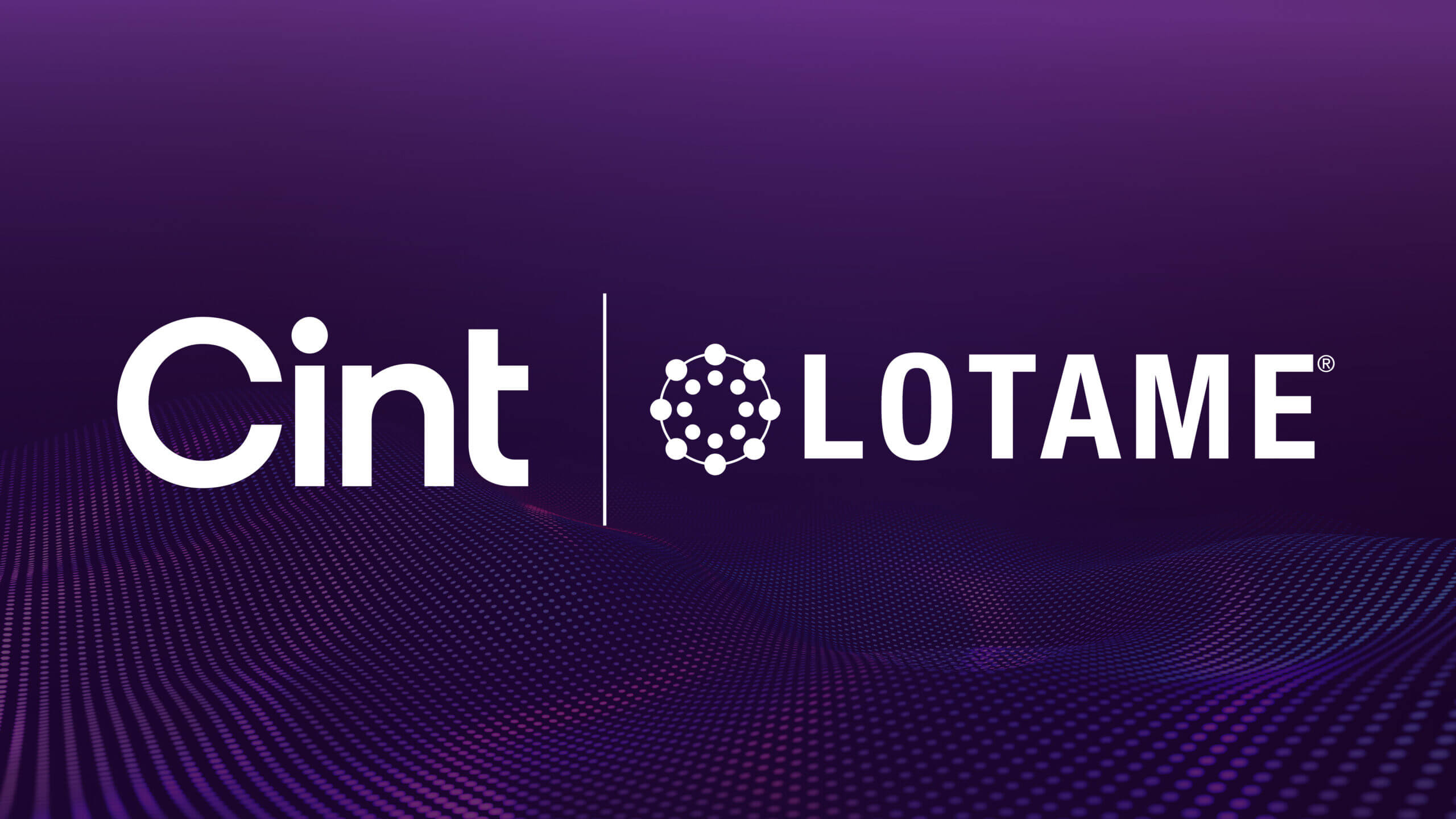
First party problems: new Cint/Lotame report highlights strategic shift in going direct to consumers
Cint, a pioneer in research technology and digital insights, today released findings from ‘The State of Data Collaboration: A Global Perspective’, a joint report on marketer and agency challenges in association with data collaboration innovator, Lotame.

Introducing Women@Cint
Cint is committed to making ourselves a more diverse and inclusive workforce. Here’s how we’re making that happen.

Cint looks to the future of Lucid Measurement by using Unified ID 2.0 for advertisers to measure brand lift.
To support privacy-conscious ad exposure and diversify available identity solutions for brand-lift measurement, Cint is excited to enable Unified ID 2.0 (UID2) for Lucid Measurement on UID2-supported demand-side platforms like The Trade Desk.

CintSnap takes a deep dive into the 2024 Formula One World Championship frenzy.
It might be the world’s premiere motorsport, but has F1 truly caught the attention of audiences in the US, UK and Australia?

How data-driven decision making is revolutionizing industries
A conversation with France Lasnier, SVP, for UK, France, Central Europe and Louis Nix, Senior Analyst, Product Operations, on the importance of a data-driven approach for companies.

How Cint keeps your data safe — and secure
A conversation with Cint experts Dhruv Mathur, Vice President, Information Security and Caroline Tahon, Data Protection Officer, on keeping data as safe and secure as possible.

Cint helps Push Digital uncover gaps in voter support and form insights to optimize targeting
Push Digital, a campaign agency active in America’s highest stakes races and debates by leveraging their digital expertise to start conversations, persuade audiences, and turn out voters, partnered with Cint on a study to uncover gaps in voter support.

Did you have a Brat summer?
Charli XCX might have dominated airwaves this summer, but how did the Brat campaign impact consumer habits?

Notting Hill Carnival 2024: CintSnap reveals UK sentiments around main attractions, sustainability, and diversity initiatives
Using CintSnap, we surveyed 300 UK respondents on how they plan to engage with the iconic celebration and what aspects of the event excite them the most.

Paralympics 2024: CintSnap reveals UK consumer insights on viewing habits, the most popular sporting events, and brand sponsorship
Using CintSnap we surveyed 300 people in the UK on how they plan to engage with the Games, most watched sports, and how brand sponsorship is perceived.

Cint Launches Study Creator
Cint reduces the time to launch Brand Lift studies

Back-to-school Survey: How Americans are preparing for the new school year ahead
Using CintSnap, we surveyed 300 Americans to reveal some trends and preferences on how they gear up for the academic year ahead.

The Booker Effect: Do literary prizes influence reading — and spending — habits?
Using CintSnap, we conducted a poll with approximately 300 people from the UK to explore what they read, how they read, and what persuades them to take a punt on a new title.

Guide to measuring political advertisements with Lucid Impact Measurement
Explore our guide to measuring political advertisements by Cint’s in-house expert Chris Pope, Senior Director of Measurement.

‘We Hear You’ – Cint Exchange launch with Lindsay Fordham
Discover the latest platform developments at Cint with Lindsay Fordham, SVP, Product.

ResTech companies Brainactive.ai and Cint announce partnership to secure leadership in AI-driven digital market research
The partnership will allow customers across all industries and geographies to run full-scale research projects at speed.

2024 Paris Summer Games
With the 2024 Paris Summer Games underway, Cint surveyed 400 French people to gauge sentiments around the world’s largest sporting event.

The TikTok effect: How the video-sharing platform is shaping voter behavior
As the UK headed to the polls on July 4th, Cint conducted a study to reveal TikTok’s influence of voters.

How researchers at Employment Hero explored the potential power of automated payroll procedures
HR, payroll and recruitment solution specialists Employment Hero conducted a survey with Cint to delve deep into how AI assistance could be a boon for payroll professionals across Australasia.

How pumped are people for Amazon Prime Day? CintSnap finds out.
As one of retail’s biggest events rolls around, we gather insights into consumer spending habits in the US, UK and Australia.

The Market Research Industry Isn’t Focusing Enough on Data Ethics; How to Solve It
Lindsay Fordham, SVP Product at Cint shares her thoughts on ethics in our industry

CintSnap reveals top reasons people in the UK flock to music festivals
With Glastonbury around the corner and a summer of festivals in full swing, we delve into everything from sustainability to the allure of secret sets.

Cint Japan announces API integration with Japanese survey engine, Muscat
The partnership will enable users to access Cint’s panel network using OPTICO, a digital platform for market research developed by looking up.

Conjointly and Cint Announce Partnership to Improve Data Quality and Reduce Survey Fraud
The partnership allows Conjointly and Cint to directly connect via a server-to-server integration, effectively eliminating “ghost completes” – a form of fraudulent survey responses.
CintSnap explores what consumers think about Father’s Day
As Father’s Day looms, Cint gets to grips with how people in the US and UK plan to celebrate – and how much they’re prepared to spend.

With Euro 2024 round the corner, we use CintSnap to assess just how football crazy the UK is
Our most recent CintSnap explores how much of the tournament people plan on watching and who they’ll be doing it with.

Cint wins Data Quality award at I-COM Data Creativity Awards 2024
Cint scoops second prize for its achievements in data quality with ground-breaking Forsta partnership on a secure server-to-server (S2S) API integration.

How a researcher at Harvard University successfully decoded the opinions of independent voters
Political scientists Andrew O’Donohue and Daniel Markovits conducted a survey with Cint to understand how prosecution of Donald Trump affected public opinion among independent voters.

Ariel Madway, Associate Director, Marketing Events on the upcoming events season
From London to Malaga and Cairns, Ariel Madway takes us on a journey through Cint’s busy events season, her planning inspiration and what she’s most excited about.

TV upfronts and NewFronts – and CintSnap insights into the state of streaming 2024
Both CTV and linear TV advertising present big opportunities for advertisers. In particular, the booming demand for CTV ads. We look at what the TV upfront and NewFronts are all about and the state of streaming in 2024.

Exploring insights on consumer sentiments around sustainability
We look at two recent reports published in partnership with Cint, that focus on global consumer sentiments around sustainability.

How to successfully navigate niche audiences: A teaser to our Whitepaper
In the world of market research, finding and engaging with niche audiences can feel like navigating uncharted territories. Gaining insights demands innovative strategies and streamlined processes.

CintSnap unveils the divide: Tipping culture in the US vs UK
When it comes to social customs and norms, few practices are as divisive as tipping expectations. We use CintSnap to survey consumer behaviour around tipping in the US and UK.

Going behind the scenes of CintSnaps: Best practices and fielding questions
Today we give you a look at how we take the pulse of the public, so you don’t have to…

Advanced Strategies: Market research data for strategic excellence
We delve into techniques and strategies used by big-hitters for leveraging market research data.

GapFish and Cint Deutschland merge to enhance the Cint offering in the DACH region
GapFish GmbH, a Berlin-based market research company that was acquired by the Cint Group in 2021 will in early April 2024 merge with Cint Deutschland GmbH.

“And the winner is..” CintSnap insights into the 2024 Oscars
With the prestigious Academy Awards marking its 96th year, we set out to discover if the glitz and glam of ceremony still holds weight in determining viewing habits of filmgoers, as well as why people tune in, how predictions played out and who they thought should have won the coveted golden globes.

International Women’s Day 2024. Cint’s Women in leadership share their career insights
To celebrate International Women’s Day, we asked some of our incredible women in leadership share their best career advice.

Insights into International Women’s Day 2024
International Women’s Day is an opportunity to celebrate wins, raise awareness and get conversations going. We’ve dived into the narrative at Cint by uncovering the insights around International Women’s Day.

Independent study names Cint #1 supplier of accurate survey responses
We’re proud to share that Cint, a global leader in market research, emerged as the leader in sample quality for online polls in a third-party study. Sapio Research, a UK market research agency, conducted the study to understand if online surveys are accurate. Sapio surveyed 2,036 UK consumers – representative by age and gender of…

Taking a (cupid’s) shot at consumer spending habits on Valentine’s Day 2024
For Valentine’s Day 2024, the National Retail Federation predicts that consumers will spend $25.8 billion. We used CintSnap to find out how people in the US and the UK approach this romantic season, by surveying 300 respondents.

Ensuring high quality sample: Introducing Cint Trust Score
John Brackett, Director of Product, introduces our latest AI-powered innovation designed to elevate data quality

New Report: Unlocking insights on The Big Game
As football fever grips the nation, the anticipation for this year’s game is reaching unprecedented heights. We surveyed the nation to understand more about how people are planning to watch, and so much more.

Celebrating International Data Protection Day with Caroline Tahon, DPO at Cint
On the 28th of January every year, the importance of personal data, and of Personal Identifiable Information (PII) is celebrated across the world on Data Protection Day.

Game, set, match: Insights into The Happy Slam
The Australian Open is the first of the four Grand Slam tennis tournaments to occur. We uncovered spectator experience through preferences and behaviors of our 280 respondents across Australia.

Redefining your experience with Cint: An exclusive look at our API-first approach
Nick Richards, Director of Product, shares an update on the work his team have been doing to comprehensively integrate every corner of product offerings on the new platform.

Feeling blue? CintSnap investigates the “most depressing day of the year”
With the festive season well behind us, and gloomy skies looming above, January for a myriad of reasons, isn’t the most exhilarating of months. This sentiment is so nationally widespread that in 2005, a UK-based travel agency coined the term ‘Blue Monday’ to mark the most depressing day of the year.

2024 Leisure travel takes flight: CintSnap unpacks vacation plans
January is a popular time for reflection and what better month to get our plans organised for the year ahead of us? A new year represents new uncharted destinations we’ve yet to discover, and for some, the usual trusted spots bring familiar comfort to recharge weary batteries.

Cint Japan and JTB Tourism Research Release Key Insights on Inbound Traveler Behavior and Sustainable Tourism
Cint and JTB Tourism Research & Consulting Co. jointly conducted a survey on changes in inbound traveler behavior and attitudes toward sustainable tourism

Embracing gender inclusivity: Empowering market research with accuracy and impact
Vishal Bhat – Program Manager, Susi Lindner – Vice President, and Sonali Kaushal – Senior Manager at Cint discuss the importance of being inclusive in language around gender.

AI in the Workplace
If Taylor Swift took up the greatest amount of air space and attention in pop culture this year; the rise of artificial intelligence (AI) – and its impact on jobs – took up the greatest amount of air space and attention in professional settings.

Ready for 2024? We look at your New Year resolutions
Saving money, eating less meat and going sober…Patricia Petrat takes a deep dive into how people across the world are ringing in the year ahead.

2023 in Review: Your favourite CintSnaps, ranked
Since there’s nothing we love more than a data driven trip down memory lane, we’ve rounded up the top 10 #CintSnaps which got the highest engagement from you this year.

The CEO view: “Think it over, think it under.”
When I took the reins from Tom Buehlmann on the 3rd of April of this year, the integration of Cint, Lucid, Gapfish and P2Sample was well under way – but there was still work to do. A lot of work.

Revolutionizing the Cint experience: A glimpse into the future
Our first video in our new interview series is with Jonathan Jaynes, Senior Director of Product Design, Cint, who shares an insider’s perspective on the groundbreaking developments underway.

Unwrapping the festive magic with CintSnap: A look into consumer feelings around Christmas ads
Our most recent CintSnap takes a festive peek into the sentiments the UK public to unveil their thoughts on this year’s Christmas ads. Join us in unwrapping the findings and discovering what makes these ads a seasonal staple for UK consumers.

Navigating the transition: behind the scenes of our new platform
When we talk about migrating customers and supply partners to our new platform, we understand that concerns may arise. In this blog post, we want to address some of the worries you may have, and give a little reassurance about the process. You’re in good hands, we promise!

Influencers, Inspiration, and Inflation: Key topics driving holiday shopping habits in 2023
The build up to the holiday season is almost palpable, Christmas lights illuminate city centers and cheese fondue and mulled wine start popping up on the menu. We pull out our coziest socks from the attic storage and gear up for hours of Home Alone movie marathons and engage in another big part of the yearly tradition -…

CintSnap delves into Black Friday and Cyber Monday shopping trends
As Black Friday and Cyber Monday (BFCM) sales continue to skyrocket and dominate global retailer revenues, Cint takes a deeper look into consumer behaviors in the US, UK, Canadian and Australian markets, and the shopping habits that drive this highly anticipated shopping season.

Lucid, a Cint Group company, earns Verified Partner status with Amazon Ads
Lucid Impact Measurement automates Global Brand Lift Measurement in Amazon DSP and Twitch DSP for Advertisers

The Beatles ‘Now and Then’: CintSnap reveals consumer sentiments of AI’s impact on the music industry
Using Cint’s owned data – that we call CintSnap – we gathered some insights around sentiments surrounding consumer behavior of the implementation of AI in the music industry, specifically on the posthumous Beatles collaboration.

Answering your questions: what does it take to build a new platform?
Innovation is in our DNA, and our mission has always been to bridge the gap between real people and organizations striving to understand and serve them. With this in mind, we’ve embarked on an exciting journey of transformation – building a new platform that will redefine the way our customers can access and leverage consumer…

Cint’s Lucid Impact Measurement introduces new Social Measurement capabilities to radically expand Cross-Platform Brand Lift Measurement
Lucid Impact Measurement by Cint is poised to change the game in an era where a patchwork of brand lift studies from multiple social platforms with differing, non-comparable methodologies is needed to gauge campaign effectiveness.

Measuring brand lift in real-time: Leveraging Lucid Impact Measurement by Cint for in-flight optimization on cross-platform campaigns
Stephanie Gall, Director of Measurement Products at Cint, examines the use of Lucid Impact Measurement to optimize advertising campaigns across linear and connected TV, digital and social channels

The next chapter of Cint: A new phase of innovation and creativity
Read on for a brief outline of the latest developments in our new platform as we continue on an exciting journey with our partners, led by our core purpose – to feed the world’s curiosity

Behind the scenes at Cint: with Events Director, Ariel Madway
In today’s blog we spend a bit of time getting to know one of our superstar team members – one who you may have met on the MR events circuit this fall.
Webinar: Improving data quality and mitigating fraud
Our recent webinar hosted by Oscar Carlsson, Chief Innovation Officer, provided an overview of industry data quality trends and outlined what Cint is doing to help.

5 pillars to success: In conversation with Jimmy Snyder, VP, Trust and Safety, Cint
Jimmy oversees an operational team focused on creating and implementing quality-related programs and policies. He shares how the team helps to ensure a healthy and efficient market research ecosystem.

How to monetize your community
Monetizing your community involves strategically leveraging its value to generate revenue. Let’s say you have an online forum, social media group or a thriving platform with active members. You can transform your online community into a profitable asset. You can monetize your community in various ways. This post explores the ins and outs of community…

Working to deliver best-of-breed consumer intelligence
John Brackett is Director of Product, working across supply, respondent experience, and trust and safety. Here he outlines some of the actions being taken to optimize one of the world’s largest digital marketplace for research sample.
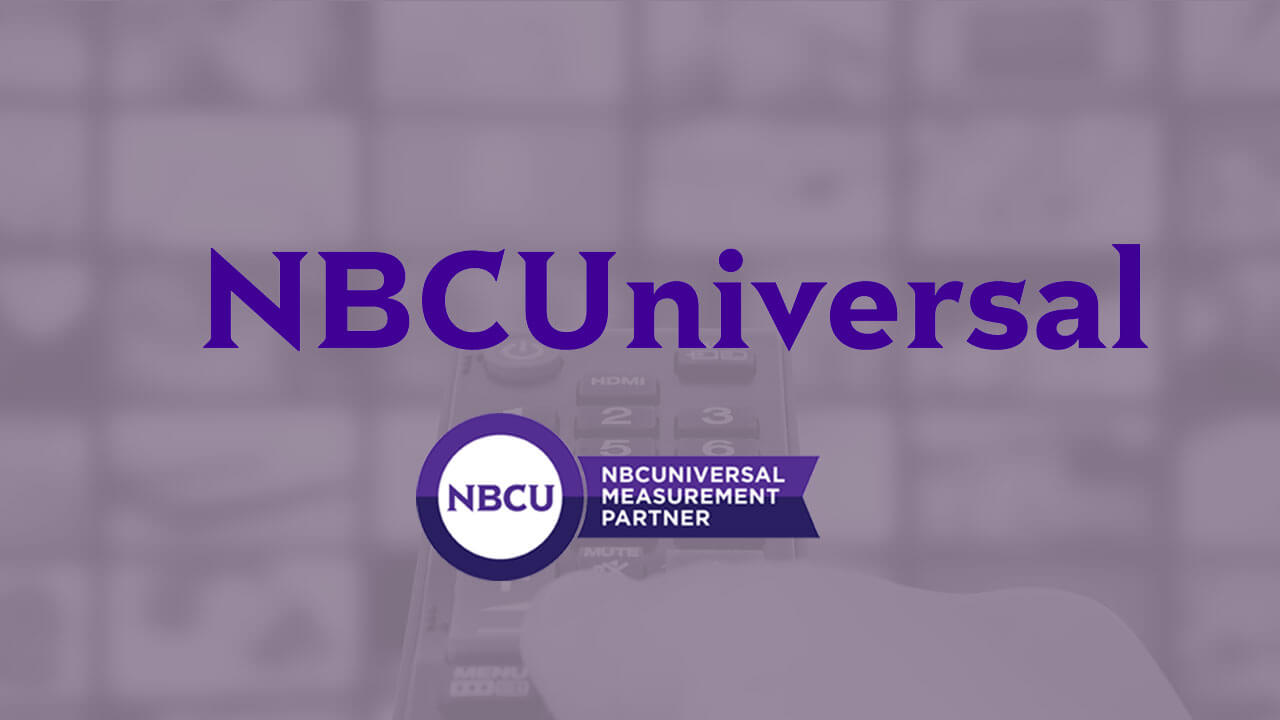
Lucid awarded NBCU Brand Measurement certification
Lucid, a Cint Group company, has been chosen by NBCUniversal as a brand measurement certified partner. The selection was made based on solution readiness, deliverables, and market presence.

Cint Snap reveals what consumers want from US Open commercials
With the final Grand Slam tournament of the year fast approaching, Cint uncovers the most successful strategies for brand engagement by asking consumers their thoughts on the sporting extravaganza


How to recruit survey respondents
When conducting market research, finding participants for a survey is crucial to gather valuable insights. Survey respondents provide the data necessary to understand target audiences and build action plans for reaching them. Their input enables data-driven decision-making, improves product or service offerings, and helps tailor marketing strategies to meet customer needs effectively.

How media measurement can help the food and beverage industry
The food and beverage industry is highly dynamic and constantly evolving, with new trends and consumer preferences always emerging. In such a fast-paced and competitive landscape, staying ahead of the game is critical for success. That’s where media measurement comes in.

In the Rise of CTV, How Do You Effectively Measure It?
CTV’s customized strategies provide marketers with massive amounts of analytics. With all the viewership data CTV provides, it often seems complicated to measure specific goals for your campaign. Using CTV measurement is critical for understanding your ad performance and information about your viewers.

Why real-time measurement is crucial for back-to-school and holiday campaign success
The Back- to- School and Holiday Shopping seasons are changing rapidly, short in nature and extremely lucrative. This blog explains the power of leveraging real-time measurement to optimize your campaign; not after completion, but while consumers are still buying.

Improving Qualification Data and Screening Questions for High-Quality Survey Results
Learn how to enhance the quality of your survey results by optimizing qualification data and screening questions. Discover strategies to avoid respondent fatigue, keep data up to date, maintain specificity without bias, innovate targeting approaches, and minimize fraud. Act now and unlock the power of connected data for business success.

4 ways to use consumer surveys in the food and beverage industry
Surveys are powerful information sources across industries and organizations. With the data pulled from customer surveys, departments can drive actions and initiatives that better reflect audiences and market conditions. The food and beverage industry can benefit from using surveys in several applications to gain more information and knowledge about their organization, products, customers and market.

Cint Launches New Data Licensing Solution to Provide Verified First-Party Data
Advertisers can take advantage of first-party data from fully-consenting consumers

Why government agencies should do market research
U.S. government market research aims to allocate resources to prioritize social services and responsibilities. Using market research to create a more effective fiscal policy or make purchasing decisions is valuable.

Cint Partners with Publishers Clearing House for Respondent Supply
Global technology leader revolutionizes data supply innovations with high-quality respondents from Publishers Clearing House

Conducting market research for the healthcare industry
In this blog, we’ll explore the importance of market research in the healthcare industry and some of the key methods and techniques that can help gather and analyze data. We’ll also discuss specific ways healthcare providers can use market research to improve operations, expand their reach and enhance the overall patient experience. Whether you’re a…

How to ask sensitive survey questions effectively: tips and strategies
Surveys are an effective way to gather valuable data and insights from a group of people. However, some survey questions may touch on sensitive topics, and require additional care.

Why Global Benchmarking can drive campaign success
By comparing your campaign’s performance against industry standards on key performance indicators (KPIs), you gain valuable insights and context that can drive better outcomes. In this blog post, we’ll explore why benchmarking your advertising campaign is essential and how Lucid Impact Measurement, a product by Cint, can help you achieve this.

Cint and Forsta Form Industry-First Partnership to Drive a Reduction in Survey Fraud
The integration of Forsta technology with Cint’s platform will eradicate nearly all ghost-completed surveys and improve quality

Identify consumer shopping struggles through surveys
With the help of customer experience research via surveys, you can locate and address pain points, in turn creating a better experience. This article will provide you with valuable insights into how to gather feedback from your customers and improve your operations as a result.

Unlocking the Power of Data Connection for Enhanced Research and Marketing Insights
Unlock the power of connected data to drive superior research & marketing. Learn how to access rich datasets, navigate legal considerations, and gain comprehensive insights. Discover four essential steps to connect data effectively.

How the public sector can use surveys to better inform decision making
Survey data can provide meaningful insights to public sector agencies. It’s one of the most powerful tools to serve your community. Public sector agencies have multiple objectives. Gathering actionable feedback is essential to help you reach your goals.
- Media Center
- E-Books & White Papers
Top 10 Reasons Why You Need Market Research
by Sarah Schmidt , on November 1, 2022

Because market research is often a significant investment, it’s important to understand why it’s so valuable and the reasons it deserve ongoing attention.
To explore this topic in more depth, I talked to a variety of professionals in a broad range of industries who were eager to explain how market research can help a business accomplish its goals as well as the disadvantages of not doing market research. Read on to learn their top reasons for why you need market research.
1. Pursue Promising Business Opportunities
Market research is an important component of any business plan. Understanding the market demand and the overall competitive landscape can help you avoid the gut-punch of business failure.
“If you get swept up in the excitement of starting a new business, your overoptimism could lead to its early downfall,” explained Max Wesman, COO at GoodHire, a background check company. “Instead of exposing yourself to risks you haven’t prepared for, it’s important to be objective. Your conviction alone cannot carry a business idea to success.”
Wesman advises businesses to conduct market research thoroughly and at regular intervals. Doing so can help you target the right group of consumers, price your products and services appropriately, create the right messaging strategy, stay ahead of market changes, and pivot when needed.
2. Make Informed Business Decisions
Market research grounds your decision-making in data and facts, which can help eliminate blind spots and allow you to set realistic targets for your company. “Business decisions are not made in a vacuum or based on assumptions,” said David Bitton, Co-Founder and CMO at DoorLoop, a rental property management software.
Because market research is data-driven, it can help organizations create strategic plans and allocate their resources and budgets effectively. Venture capitalists, investment banks, and management consultants all routinely rely on market research, because high-stakes decisions require much more than guesswork or hunches. Before taking a leap, people want to see the data.
3. Gain a Competitive Advantage
Market research is also an important tool for benchmarking and competitive analysis in a market defined by constant change.
“New innovations and companies enter the market every day, so performing market research is an essential part of staying competitive,” said Laurel Mintz, Founder and CEO of Elevate My Brand, a marketing agency based in Los Angeles. “It’s important to use direct, indirect, and aspirational competitors as a comparison to where you are, not only to see how you can improve, but also to use for marketing.”
For example, if a company does market research and they discover that their prices are significantly lower than the competition, it could be a sign to raise prices or use their low prices in their marketing strategy, according to Mintz.
4. Stay Current and Relevant to Consumers
In addition, when you truly understand your competition, and how industry trends are shifting, you give your company the opportunity to adapt.
Market research can even give brands the chance to adopt new concepts from other companies within their market. “Inspiration is a powerful tool,” explained David Batchelor, President of DialMyCalls.com, a texting and calling solution. “Industries are constantly evolving due to new technology and changing consumer behaviors. So if you’re not a ‘first-mover,’ you need to be a ‘fast-follower’ as a result of thorough market research.”
5. Develop an Effective Marketing Strategy
Market research should also help inform all your marketing efforts so you create content that resonates with your target audience and produces real results. You should know who you are creating marketing content for, who you are attracting into your sales funnel, and what their pain points are.
Understanding and marketing to the right audiences is key. “Companies that skip this essential step may lose insights, additional sales, and brand strength that all add up overtime,” said Jason Panzer, President of HexClad, a company that produces hybrid stainless steel nonstick pans.
6. Refine Your Messaging During Pivotal Moments
Market research can not only improve the effectiveness of your marketing strategy, but it can also help you avoid PR disasters that can tank your brand’s reputation and push loyal customers away.
“Unexpected events like the pandemic and inflation have changed consumer shopping trends in drastic ways, so how you address these issues can either help or hurt your brand,” explained Greg Gillman, Chief Revenue Officer at MuteSix, a performance marketing agency accelerating growth for disruptor brands. “By understanding the impact of world events on customers, you will avoid coming off as tone deaf to those issues.”
7. Take Your Sales to the Next Level
Market research can also improve the bottom line by helping you cross-sell, upsell, and create highly personalized and targeted pitches, according to Manish Mishra, Associate Director of Sales at LeadSquared, a marketing automation and CRM software for businesses.
What’s more, the insights you glean for your sales team can build on each other over time. As Mishra explained it, “Strategies for when, what, and how much to sell can be sketched out from the available information. Similar to how it takes multiple meetings to build a relationship, market research gives much better information about leads when it is repeated regularly.”
8. Identify Avenues for Growth
In addition to boosting sales and marketing efforts, companies also use market research to enhance product development and to plan how to expand into new markets.
“Regular market research initiatives within your company can help you discover new opportunities for growth and improvement,” said Laurice Constantine, Digital Managing Editor at Forbes Middle East and Founder of Casadar.com, an online marketplace that connects buyers with sellers and consultancy service providers in the field of decoration, architecture, and interior remodeling. “You might discover that there are untapped customer bases that would benefit greatly from your products or services. You may also discover that your products or services could be improved.”
Market research can also give you ideas for ways to combine offerings, create add-ons, or upsell items to boost your profits.
9. Reduce Risk and Gain Support from Stakeholders
Although risks are inevitable when running a business, market research can help you decrease them during the start-up phase and beyond. “An effective way to make informed decisions and reduce pitfalls is through market research,” according to Igal Rubinshtein, Founder at Home Essentials Direct, an online marketplace for home goods and DIY projects. “Through past information and by predicting future trends, you are undeniably in a better place to make a decision in the direction of growth.”
Having data to back up your ideas can also help bring other stakeholders on board, whether you need the approval of the executive suite, to win over investors for your business, or to impress clients. By providing a solid foundation for your idea, market research can help you make a persuasive case and tip the balance in your favor.
10. Save Time and Money
Lastly, market research can help you streamline your business operations and avoid waste.
“Targeted efforts are always more effective than broad ones,” explained Geoff Cudd, Founder of Don’t Do It Yourself, a website that provides advice and reviews to help people choose the best freelancers and tools to grow their business. “By conducting market research, you can avoid wasting time and money on marketing and advertising efforts that don’t reach your target market. Instead, you can focus your resources on strategies that are proven to be effective with your specific audience. This will help you get the most bang for your buck and use your resources more efficiently.”
Market research can also help you understand where the market is going, so you can plan what business lines to scale up or scale down, and ensure your investments are proportional to market demand.
When you have tough business questions, market research can help you move forward with confidence. Will it pay off to acquire a new company, build another factory, or expand your business into another country? Market research can help answer these types of critical questions and position you for success.
Where to Start
When you need market research, MarketResearch.com is here to help. With more than 20 years of experience in the market research industry, hundreds of market research report publishers, and thousands of clients, no one is better suited to help you zero in on research you can trust. Contact us anytime for help finding what you need at the best price available.
In addition, please download our free white paper for more information on the value of market research for validation and decision making.

About the Author : Sarah Schmidt is a Managing Editor at MarketResearch.com, a leading provider of global market intelligence products and services.
Additional Resources
- 7 Key Advantages of Outsourcing Market Research Services
- How to Use Market Research for Onboarding and Training Employees
- Primary Data vs. Secondary Data: Market Research Methods

About This Blog
Our goal is to help you better understand your customer, market, and competition in order to help drive your business growth.
Popular Posts
- A CEO’s Perspective on Harnessing AI for Market Research Excellence
- 10 Global Industries That Will Boom in the Next 5 Years
Recent Posts
Posts by topic.
- Industry Insights (867)
- Market Research Strategy (274)
- Food & Beverage (135)
- Healthcare (129)
- The Freedonia Group (121)
- How To's (110)
- Market Research Provider (98)
- Pharmaceuticals (84)
- Manufacturing & Construction (83)
- Packaged Facts (78)
- Telecommunications & Wireless (72)
- Heavy Industry (70)
- Retail (59)
- Marketing (58)
- Profound (57)
- Software & Enterprise Computing (57)
- Transportation & Shipping (54)
- Medical Devices (52)
- House & Home (51)
- Materials & Chemicals (49)
- Consumer Electronics (46)
- Energy & Resources (44)
- Public Sector (40)
- Biotechnology (39)
- E-commerce & IT Outsourcing (39)
- Business Services & Administration (38)
- Demographics (37)
- Diagnostics (36)
- Education (36)
- Custom Market Research (35)
- Travel & Leisure (34)
- Academic (33)
- Financial Services (30)
- Computer Hardware & Networking (28)
- Simba Information (24)
- Kalorama Information (21)
- Cosmetics & Personal Care (19)
- Knowledge Centers (19)
- Apparel (18)
- Market Research Subscription (16)
- Social Media (16)
- Advertising (14)
- Big Data (14)
- Holiday (11)
- Emerging Markets (8)
- Associations (1)
- Religion (1)
MarketResearch.com 6116 Executive Blvd Suite 550 Rockville, MD 20852 800.298.5699 (U.S.) +1.240.747.3093 (International) [email protected]
From Our Blog
Subscribe to blog, connect with us.

Strategy Studies
Importance of market research in developing a strategy.
Home > Back
Specialties

Developing a successful strategy is crucial for the growth and sustainability of any organization. One of the key pillars of strategy development is market research. Market research provides valuable insights into the market dynamics, customer preferences, and competitive landscape, enabling businesses to make informed decisions and devise effective strategies. In this article, we will explore the importance of market research in developing a strategy and the various steps involved in conducting comprehensive market research.
Table of Contents
Introduction
In the fast-paced and dynamic business environment, companies need to stay ahead of the curve to remain competitive. Market research acts as a compass, guiding businesses through the complex marketplace by providing relevant information and actionable insights. It involves gathering and analyzing data about customers, competitors, and market trends to uncover opportunities and challenges.
Definition of Market Research
Market research can be defined as the process of collecting, analyzing, and interpreting information about a market, its customers, and competitors. It helps businesses understand the needs and preferences of their target audience, identify market trends, and evaluate the competitive landscape. By conducting market research , companies gain a deeper understanding of their industry, enabling them to make data-driven decisions.
Importance of Market Research
- Identifying Market Opportunities : Market research helps businesses identify untapped market segments, emerging trends, and unmet customer needs. By understanding market gaps and customer pain points, companies can develop innovative products or services that cater to specific demands, gaining a competitive edge.
- Understanding Customer Behavior : Market research provides insights into consumer behavior, including purchasing patterns, preferences, and motivations. This understanding allows businesses to tailor their offerings to meet customer expectations, leading to higher customer satisfaction and loyalty.
- Target Market Identification : Market research helps in identifying the target market for a product or service. By segmenting the market based on demographic, psychographic, and behavioral factors, businesses can tailor their marketing efforts and messages to resonate with the intended audience.
- Competitive Analysis : Market research enables businesses to assess the competitive landscape and understand their position relative to competitors. It helps identify strengths, weaknesses, opportunities, and threats (SWOT analysis) to formulate strategies that leverage strengths and mitigate weaknesses.
- Market Trends and Opportunities : By monitoring market trends, businesses can identify emerging opportunities and adapt their strategies accordingly. Market research helps in forecasting industry trends, technological advancements, and consumer preferences, enabling businesses to stay ahead of the curve.
Types of Market Research
Market research can be broadly categorized into two types: primary research and secondary research.
- Primary Research : Primary research involves collecting firsthand data directly from the target market. This can be done through surveys, interviews, focus groups, or observations. Primary research provides specific and up-to-date information tailored to the research objectives.
- Secondary Research : Secondary research involves gathering and analyzing existing data from various sources such as government publications, industry reports, market studies, and competitor websites. It provides a broader perspective on the market and helps in understanding historical trends and benchmarking against industry standards.
Steps in Conducting Market Research
- Defining Research Objectives : Clearly defining research objectives is the first step in conducting market research. It involves identifying what information needs to be gathered, the purpose of the research, and the specific questions to be answered.
- Designing the Research Methodology : Based on the research objectives, the appropriate research methodology is selected. This includes determining whether primary or secondary research methods are more suitable and selecting the specific data collection techniques.
- Collecting Data : Data collection involves gathering relevant information using various techniques such as surveys, interviews, focus groups, or data mining. Careful consideration is given to sample size, sampling method, and data quality to ensure the validity and reliability of the findings.
- Analyzing Data : Once the data is collected, it is analyzed using statistical techniques, data visualization tools, or qualitative analysis methods. The goal is to uncover patterns, trends, and relationships within the data that can inform decision-making.
- Interpreting Findings : The findings from the data analysis are interpreted to derive actionable insights. This involves identifying key findings, understanding their implications, and drawing conclusions that address the research objectives.
Understanding Consumer Behavior
Understanding consumer behavior is a crucial aspect of market research. By gaining insights into what motivates consumers to purchase, how they make decisions, and what influences their behavior, businesses can create effective marketing strategies. Consumer behavior is influenced by various factors such as cultural, social, personal, and psychological factors. Market research helps in identifying these factors and tailoring marketing efforts to resonate with the target audience.
Identifying Target Market
Identifying the target market is essential for developing a successful strategy. Market research helps businesses segment the market based on various criteria such as demographics, psychographics, and behavioral patterns. This segmentation allows businesses to understand the unique needs and preferences of different customer groups, enabling them to create targeted marketing campaigns and product offerings.
Competitive Analysis
A thorough competitive analysis is a crucial component of market research. It involves assessing the strengths and weaknesses of competitors, analyzing their marketing strategies , and identifying areas where a business can gain a competitive advantage. By understanding the competitive landscape, businesses can differentiate themselves and position their offerings effectively.
Market Trends and Opportunities
Monitoring market trends and identifying opportunities is essential for developing a strategy that is future-proof. Market research helps businesses stay informed about industry trends, technological advancements, and changing consumer preferences. By anticipating shifts in the market, businesses can proactively adapt their strategies and capitalize on emerging opportunities.
SWOT Analysis
A SWOT (Strengths, Weaknesses, Opportunities, and Threats) analysis is a framework used to assess the internal and external factors that impact a business. Market research plays a significant role in conducting a comprehensive SWOT analysis. It helps businesses identify their strengths and weaknesses by analyzing internal factors such as resources, capabilities, and brand perception. Additionally, market research helps in identifying external opportunities and threats by evaluating market dynamics, competitor actions, and industry trends.
Developing a Strategy
Market research forms the foundation for developing a robust and effective strategy. The insights gained from market research help businesses make informed decisions regarding product development, pricing, distribution channels , and marketing communication. A well-defined strategy aligns the business’s objectives with market realities and customer needs, increasing the chances of success.
Implementing and Monitoring the Strategy
Once a strategy is developed, its successful implementation is vital. Market research helps in monitoring the implementation of the strategy by providing feedback and evaluating its effectiveness. By tracking key performance indicators (KPIs), businesses can assess whether the strategy is yielding the desired outcomes and make necessary adjustments if needed.
Final Thoughts on The Importance of Market Research
Market research is a critical component of strategy development. It provides valuable insights into the market, customer behavior, and competitive landscape. By leveraging market research, businesses can identify market opportunities , understand customer needs, and develop effective strategies. The systematic approach of market research ensures that decisions are based on data and analysis rather than assumptions, increasing the likelihood of success.

Get the Strategies
Get the latest posts delivered to your inbox for free.
Ian has marketed for some of the world's best-known brands like Hewlett-Packard, Ryder, Force Factor, and CIT Bank. His content has been downloaded 50,000+ times and viewed by over 90% of the Fortune 500. His marketing has been featured in Forbes, Inc. Magazine, Adweek, Business Insider, Seeking Alpha, Tech Crunch, Y Combinator, and Lifehacker. With over 10 startups under his belt, Ian's been described as a serial entrepreneur— a badge he wears with pride. Ian's a published author and musician and when he's not obsessively testing the next marketing idea, he can be found hanging out with family and friends north of Boston.
Subscribe to Forward Weekly
Get the marketing strategies in your inbox.
Sign up for our 1x a week newsletter (no spam!)
Popular Posts

Get the Guide
You'll learn how to:
- Generate more demand for your product or service
- What channels to start with at first
- Strategies to maximize your lead generation
- And so much more!

Houston, we have a problem... you need to login first!
Register For This Site
A password will be e-mailed to you.
Get In-Depth Marketing Strategies
Sign up to get in-depth marketing strategies, tactics, and case studies delivered right to your inbox.
100% privacy. We will never spam you!
Copyright @ MarketingStrategy.com 2024. All Right Reserved.
What's Market Research? Why is it Important?
- Aug 29, 2023
Market research is a game-changer for businesses looking to understand their customers, outsmart the competition, and stay on top of industry trends. By diving into data and analyzing it, market research reveals invaluable insights that shape smart decisions, drive product development, and power marketing campaigns. Especially now in today's competitive business world, where things change faster than a viral meme, market research is more critical than ever. So, let's dive into the exciting world of market research, explore why it's super important, and dish out some practical tips to make it work like a charm.
The Foundation of Market Research
Market research has always played a huge role across all industries. In fact, it is expected to grow even bigger to up to $86.49 billion by 2027, according to the Marketing Research And Analysis Services Global Market Report 2023 . To know more, let's discuss first what makes up market research, why it is important, and why you should do it.
What's the Buzz about Market Research?
Market research is all about getting the scoop on a specific market, target audience, or industry. It involves digging up data, both primary and secondary, to find golden nuggets of information that can make your business shine. Think of it like detective work, but instead of solving crimes, you're solving business challenges.
Why Should You Care about Market Research?
Market research is the secret sauce behind making informed decisions. It's like having a crystal ball that reveals what your customers really want, helps you spot the latest trends, and shows you how your competition is doing. It's like having a superpower to read minds (well, sort of). With market research, you can understand your customers' needs and expectations better than anyone else, create products they'll love, and stand out from the crowd.
Let's say you're running a hip skincare company. With market research, you might discover that millennials are going crazy for natural and organic products. Armed with this insight, you can whip up a line of all-natural skincare goodies that'll make customers line up your store.
Market research also helps you dodge potential disasters. Picture this: you're about to launch a new product or enter a new market. Market research can save you from facepalming moments by showing you if there's enough demand, what obstacles you might face, and if your brilliant idea has legs.
The Sweet Benefits of Market Research
Market research has tons of benefits. Here are some of the top ones:
Unleashing Market Opportunities
Market research is your treasure map to finding hidden market gems. It helps you spot untapped customer segments, emerging trends, or niche markets that others haven't noticed. It's like having a radar that detects opportunities others can't see. By jumping on these golden chances, you can outshine your competition and become the cool kid in the market.
Understanding Your Customers' Secret Desires
Market research dives deep into your customers' minds, uncovering their preferences, habits, and pain points. It's like becoming a mind reader. By understanding what makes your customers tick, you can create products and services that tickle their fancy, making them fall head over heels for your brand.
But wait, there's more! Market research reveals hidden desires and frustrations your customers have with existing products. By swooping in and fixing those pain points, you become their hero and gain an army of loyal fans. Imagine a ride-sharing company that learns from market research that long wait times are driving people crazy. By tackling this issue head-on and reducing wait times, they become knights in shining armor for their customers.
Being a Sneaky Competition Spy
To beat the competition, you need to know them like the back of your hand. Market research gives you the inside scoop on your competitor's strategies, strengths, and weaknesses. It's like having a spy network that feeds you juicy intel. By understanding what your rivals are up to, you can create strategies that outsmart them, differentiate yourself, and come out on top. There are several SEO tools that you can utilize in analyzing your competitors.
The All-in-One Platform for Effective SEO
Behind every successful business is a strong SEO campaign. But with countless optimization tools and techniques out there to choose from, it can be hard to know where to start. Well, fear no more, cause I've got just the thing to help. Presenting the Ranktracker all-in-one platform for effective SEO
We have finally opened registration to Ranktracker absolutely free!
Or Sign in using your credentials
Let's say you're a trendy clothing retailer. Market research shows that while your competitors are all about fast fashion, there's a gap for sustainable clothing options. By hopping on the sustainability train and offering eco-friendly fashion, you become the eco-warrior of the fashion world.
Dodging Bullets and Taking Calculated Risks
Launching a new product or venturing into uncharted territories can be as scary as spiders (well, almost). Market research is your secret weapon to assess market demand, identify potential roadblocks, and calculate risks. It's like having a crystal ball that tells you if your brave adventure will end in fireworks or faceplants. With market research, you make informed decisions that save you from costly blunders.
Imagine you're a software company eyeing a new industry. Market research helps you figure out if there's a market for your software, who your competitors are, and what customers really need. Armed with this knowledge, you can swoop in, adapt your product to fit their needs and conquer the industry like a boss.
Market Research Methods: The Sleuth Toolkit
So how do you perform market research like a pro? Here are several tips you can follow:
Primary Research: Talking to the People
Primary research is like getting firsthand gossip from your target audience. It involves talking to them through surveys, interviews, focus groups, or even observing their behaviors. It's like having a direct line to their thoughts and feelings.
Surveys are the go-to method for gathering quantitative data from a bunch of people. It's like throwing a questionnaire party and asking everyone for their opinions. By analyzing the survey responses, you can get insights into customer demographics, preferences, buying behaviors, and if they prefer pizza or tacos.
On the other hand, interviews and focus groups are your backstage passes to deep conversations with your customers. It's like having a coffee chat with them (minus the caffeine). These methods unveil the juicy details behind their decisions, motivations, and emotions. It's like finding out why they prefer pizza over tacos and what toppings make them weak at the knees.
Secondary Research: Borrowing Wisdom from Others
Secondary research is like tapping into a library of knowledge that already exists. It involves using existing data sources like industry reports, competitor analysis , and customer databases. It's like reading books written by the smartest folks in the biz.
Industry reports and market research studies are your secret stash of information. They dish out market trends , consumer behaviors, and future forecasts. It's like having a magic crystal ball that reveals where the market is heading.
Competitor analysis is your backstage pass to your rivals' strategies and secrets. By studying their every move, you can discover opportunities they missed and craft strategies that make them go, "Wait, why didn't we think of that?"
Customer databases and online platforms are like treasure troves of information. Social media and review websites reveal what customers really think about products and brands. It's like eavesdropping on their conversations at a coffee shop (but in a totally legal way).
Quantitative vs. Qualitative Research: Numbers and Stories
Quantitative research is like crunching numbers to unlock hidden patterns. It's all about statistics, graphs, and charts. It's like going on a data adventure to uncover insights that drive decisions. Regression analysis and data modeling are like your trusty sidekicks, helping you make sense of the numbers. Trending changes in people looking for vacation rental managers
Qualitative research, on the other hand, is like exploring stories and narratives. It's about uncovering the why behind the what. Think of it as reading bedtime stories that reveal customers' hopes, dreams, and frustrations. Techniques like thematic analysis and content analysis are your Sherlock Holmes tools for uncovering the juicy details.
By blending quantitative and qualitative research, you get the best of both worlds. It's like mixing peanut butter and jelly to create a mouthwatering sandwich. Quantitative data gives you the big picture and numerical insights, while qualitative data brings in the human touch and deep understanding.
Let's say you're a sneaker brand trying to understand your customers. Through quantitative research, you analyze sales data, demographics, and purchase patterns. You discover that 70% of your customers are millennials who prefer athleisure sneakers. That's the big picture.
But to truly understand why millennials love your sneakers, you dive into qualitative research. You conduct focus groups and ask them questions like, "What makes our sneakers special?" and "How do they make you feel?" Through these conversations, you uncover that they love your brand because it represents their active lifestyle and gives them a sense of self-expression. That's the human touch.
Rocking Market Research Like a Pro
So now that you have learned some tips and techniques, it's time to put them into action. You can follow the steps below as your guide.
Setting Your Detective Goals
Before you embark on your market research adventure, set clear objectives. What do you want to uncover? What burning questions need answers? By defining your goals, you focus your efforts and make sure you're not wandering around aimlessly like a lost puppy.
For example, if you're a tech company, your goal might be to understand the pain points and challenges your target customers face with their current software. With this objective in mind, you tailor your research methods and questions to dig deep into those pain points.
Finding Your Target Audience
To get the best results, make sure you're talking to the right people. Define your ideal customer profile and ensure your research methods align with their characteristics. It's like inviting your best friends to a party rather than random strangers.
If you're a beauty brand targeting Gen Z consumers, go where they hang out. Use online surveys and social media listening to gather insights from this tech-savvy demographic. You want to hear from the TikTok-savvy, Instagram-obsessed Gen Zers who can't resist trying new beauty hacks.
Embracing the Tech Marvels
In today's digital age, businesses have a wealth of tools and technologies at their disposal, such as the best online marketing graduate programs , among others. Embracing these resources can supercharge your market research efforts. Online surveys, data analysis software, and social media monitoring tools can be your trusty sidekicks in the market research adventure.
Automated survey platforms make it a breeze to design, distribute, and analyze surveys. They save you time and make data collection a piece of cake. Social media monitoring tools help you rankings in search engine results , brand mentions, sentiment analysis, emerging trends, etc. It's like having a superhero gadget that scans the online world for you.
Unleashing the Power of Analysis
Collecting data is just the start. The real magic happens when you analyze and interpret the findings. Use statistical techniques, data visualization tools, and qualitative analysis methods to unlock the insights hidden within the data.
Statistical analysis lets you uncover patterns and trends in the data. Regression analysis, t-tests, and chi-square tests become your trusted allies. Data visualization tools, like charts and graphs, make the data come to life and help you spot the key takeaways.
Qualitative data analysis allows you to uncover the stories and narratives behind the data. Thematic analysis and content analysis become your storytelling tools, revealing the emotions, motivations, and desires of your customers.
Taking Action: From Insights to Impact
Market research should never end with a bunch of fancy reports gathering dust on a shelf. It's time to take action! Use the insights you've gained to make informed decisions, refine your strategies, and optimize your marketing efforts. It's like turning research into real-life superheroes.
For example, if market research reveals that your customers are craving a certain feature in your product, don't just sit on that information. Take action! Implement the feature, improve your customer support, or adjust your pricing. By putting those insights into practice, you turn them into a force that propels your business forward.
Make sure to communicate the findings and recommendations across your organization. Share the insights with your team, involve them in the decision-making process, and make sure everyone is on the same page. And don't forget to keep an eye on the results. Monitor the impact of your actions, gather feedback, and be ready to adapt if needed. It's like fine-tuning your superhero powers to save the day.
Market Research: Unlocking Business Insights
Market research is like having a superpower in the business world. It gives you insights, helps you understand your customers, and keeps you one step ahead of the competition. By conducting thorough market research and taking action based on the findings, you can make smarter decisions, drive innovation, and achieve incredible growth.
Remember, market research is an ongoing adventure. The business landscape is always changing, and customer preferences evolve faster than the latest dance craze. Stay curious, keep exploring, and embrace the power of market research to unlock your business's true potential.
Felix Rose-Collins
Ranktracker's ceo/cmo & co-founder.
Felix Rose-Collins is the Co-founder and CEO/CMO of Ranktracker. With over 15 years of SEO experience, he has single-handedly scaled the Ranktracker site to over 500,000 monthly visits, with 390,000 of these stemming from organic searches each month.
The all-in-one platform for effective SEO
- Rank Tracker
- Keyword Finder
- SERP Checker
- Backlink Checker
- Backlink Monitor
- Website Audit
- AI Article Writer
Create your account today. No credit card is needed.
Start using Ranktracker… For free!
Find out what’s holding your website back from ranking.

Market Research: What It Is, Why It Matters, and How To Get It Right

Free Website Traffic Checker
Discover your competitors' strengths and leverage them to achieve your own success
What is market research?
What is market research used for? How important is it? And, how do you choose the right type of research for your business?
Sit back, take five, and I’ll explain the different types of research , what tools are best for the job, and how you can leverage them to grow your business and master your market .
Market research definition:
Market research means to systematically collect and analyze data about a target market or defined segment. It’s a multivariate process that uncovers key facts and insights to inform decisions.

Whether you’re launching a new product , looking for ways to expand a business, or seeking out efficiencies in an existing company, market research is a highly effective way to flesh-out ideas, innovate, and grow.
Advantages of market research
Market research helps you identify your greatest strengths, threats, and opportunities. It can help you find your way when markets become tough to predict and find efficient ways to grow your business .
- Reduce costs
- Define detailed customer personas
- Make data-driven decisions
- Find new opportunities for growth
- Unpack competitor’s successes
- Develop an informed content marketing strategy
- Identify trends
- Inform market analysis
- Discover the best marketing channels to use
- Find the best ways to communicate with customers
- Benchmark performance against rivals
Online market research can help the whole business at any stage of its life. When practiced consistently and systematically, you can realize its many benefits.
Why is market research important?
Market research helps you identify your greatest threats. And it also gives you a clear picture of opportunities you can capitalize on for greater returns on your business investments, or ROI.
Understanding your specific market on different levels and from different perspectives helps you reach well-informed, data-informed decisions . The process can involve multiple phases. But, if you follow a systematic approach using a market research template , your efforts will pay off.
For more, check out our blog: Importance of Market Research: 9 Reasons Why It’s Crucial for Your Business
To skip ahead and start right now, download our free pack of market research templates.
Different types of market research
Market research is a questions and answers game. Once you’ve asked the important questions, you’ll need to choose the right type of research to get your answers. There are four core types of research, each of which can be applied to help you solve a problem or gather insights to inform key decisions.
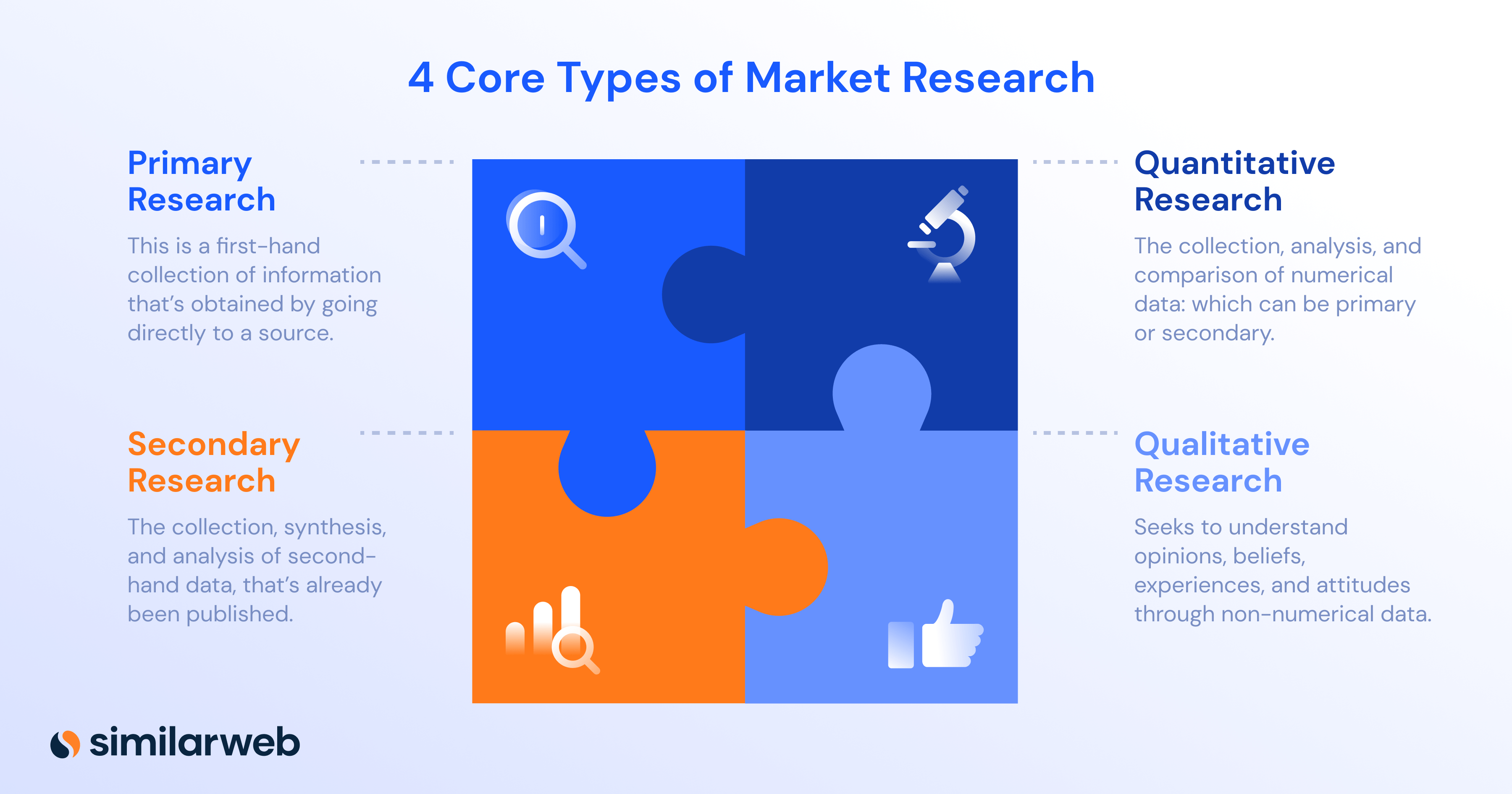
Primary market research
Primary market research is the first-hand collection of data. It’s data that’s not available to others, and can be obtained in a number of ways. Here are the most common.

- Web Metrics Use analytics software that provides traffic and engagement metrics to understand how audiences behave.
- Observation To observe how users behave and navigate your site, you can install software that records visits and creates heatmaps. Such tools are useful for qualitative research regarding your UX/UI and at the same time, quantify the findings.
- Customer surveys Survey questionnaires and polls can be distributed to any number of customers through email, SMS, your site, or social media. They let you collect both qualitative and quantitative data from respondents using open-ended questions.
- Focus groups You select a small number of people for a group discussion. A moderator leads the session with questions and records the conclusions. This is also a form of qualitative research, and you would use it to get in-depth information.
- Face-to-face interviews Another qualitative assessment method is one-on-one interviews. Consumers representative of your target audience or a segment of it are selected to answer questions about a specific research topic.
- Phone calls To involve a larger number of people and get more answers, you can conduct surveys over the phone. These interviews would be less specific and include fewer questions.
Helpful: A complete guide to doing primary market research
Secondary market research
Secondary research is second-hand data that has already been produced. It’s available to all who wish to consume it. Using this type of data is preferred by those who wish to keep costs low, as it can be quicker and freely available.

- Government reports and census data Annual, quarterly, and other periodic industry reports are a rich data source to tap into. Government organizations publish statistics in areas of trade, ecommerce, and finance.
- Academic papers and educational resources University research is a source of high-quality information. This is useful for in-depth background information on a broad scale.
- Online articles and case studies, public and commercial sources Industry-specific publications can be a valuable source of information for market segmentation, providing you with data and insights on market trends or a specific market segment or niche.
Further reading: A complete guide to doing desk research
Qualitative market research
Qualitative market research is one of the best ways to understand how people think or feel about a brand, product, or service. It takes more time to plan and analyze the results than other market research types. However, with tools like market research surveys , there are quick and effective ways to do it.
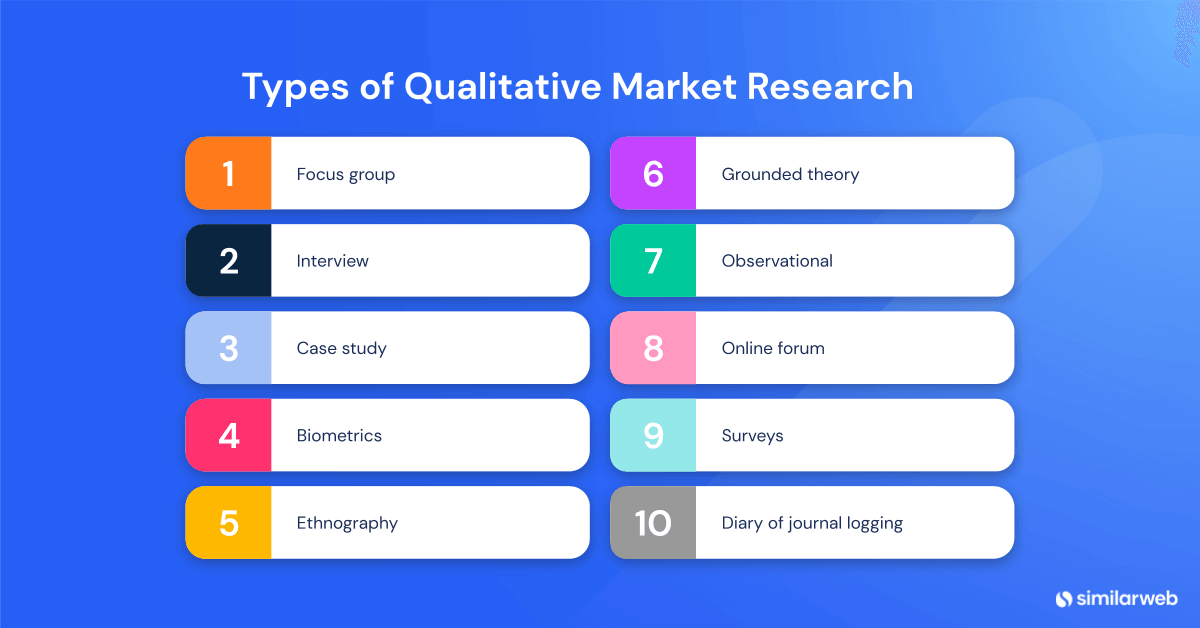
As some of the methods are outlined in the primary and secondary research sections, I’ve included a short list of qualitative research methods below.
- Focus groups
- Case study or whitepaper
- Online forums
- Biometrics
- Ethnography
Helpful: Read the complete guide to qualitative research and 83 qualitative research questions & examples
Quantitative market research
Quantitative market research is all about numbers. It collects numerical data to help answer specific research questions . The information collected can be easily quantified and analyzed to establish trends, insights, and patterns.
With this type of research, you’ve got three core data collection methods. However, you’ve also got to consider the design of the research, which can impact which method is used.
What is market research used for?
The applications for market research are virtually limitless. Market research can help you unravel the most complex of business challenges to reach data-driven decisions , and when used consistently, it can help you navigate turbulent times, fuel growth, and support your success . Here are just a few examples of what market research is used for, with a few real-world examples thrown in for good measure.
1. Company research
Market research allows you to shine a spotlight on any business and unpack its wins and losses for your own gain. Let’s say you are doing market research for a business plan ; you’ll likely want to evaluate the successes of others in your industry. Doing systematic company research is a proven way to inform a SWOT analysis .
Doing industry analysis can show you who your industry leaders are , along with any emerging players showing exponential growth.

Let’s say I want to find out which companies to research, I would use Similarweb Digital Research Intelligence to analyze an industry. Here, I can see who my top companies to watch are instantly. It also shows me other companies showing rapid growth in my market.
Read More: How to Research a Company: The Ultimate Guide
2. Competitive benchmarking
Most of your relevant data will come from your competition. If you plan to offer something that’s new for you but already exists in the market, learn from other’s mistakes and successes. If your goal is to evaluate and optimize, collect competitors’ data, and compare it to yours. See what works for them, find their weak spots, and improve on them.

What market research gives you here, is the ability to systematically compare each of your rivals. And, it’s not as complex as it sounds either. Simply choose a type of competitive analysis frameworks to use, complete the template for each; then compare the results to uncover relevant insights.
Read More: The Why and How of Competitive Benchmarking
3. Trendspotting
Another objective for market researchers is to forecast upcoming trends. Data collection over time helps you understand the dynamics of the market. Some markets have strong seasonal fluctuations. Increased shopping during December is an obvious example, but often these shifts are not always evident unless you measure and analyze them specifically.
With the data from your historical market research, you can evaluate their impact and the likelihood you will keep seeing these trends. Based on that, you can make predictions about future developments.
4. Audience analysis
Who will find your product most useful and why?
Examining the size of your audience and the existing demand for your product or services is crucial. Understanding your target audience allows you to build your product offering and marketing strategy more efficiently. You also want to learn first-hand where people buy this type of product and how much they are willing to spend so that you can estimate your reachable market share .

Here’s a quick example of how we use Similarweb to do effective audience analysis . You can unpack key audience demographics for any site you choose. And get up-to-date stats about gender, age, location, interests, browsing habits, and more.
5. Market segmentation
There are lots of ways to segment a market. Doing this well can deliver higher conversions, reduce costs, redefine marketing strategies, and help you connect with customers on a more personal level. Market research can help you do most types of market segmentation, the most widely adopted of all is demographic segmentation . Here, you look for shared but specific characteristics of a target audience.
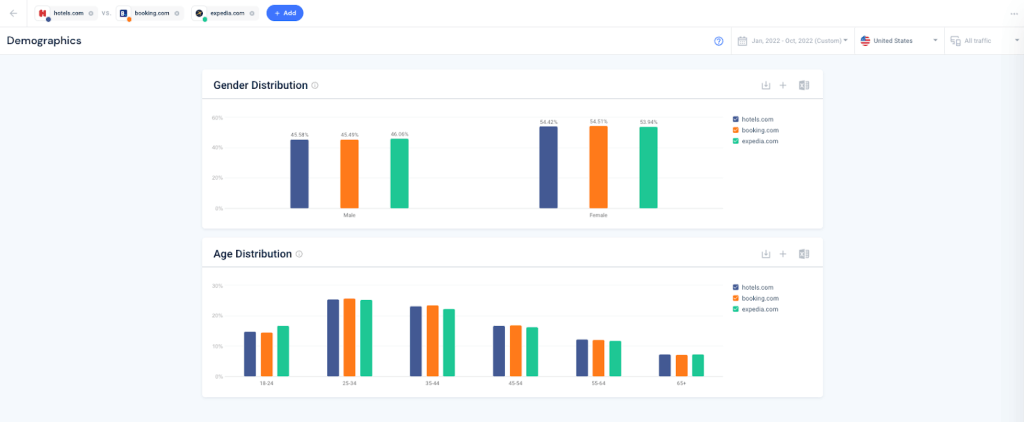
Using Similarweb, I can view audience demographics for a website, and compare it side-by-side with rival sites. In this example, I am looking at hotel booking sites to try and spot any difference between the respective audiences of each.
Helpful: Read our complete guide to market segmentation
6. Marketing strategy
Market research can also help you reach the right decision regarding where to advertise or market your business. After analyzing the data, you’ll know which marketing channels are most effective with your target audience. You can also use research to look at the specific keywords and ad creatives that are generating the best responses and ROI.

Similarweb Digital Research Intelligence makes this type of research effortless. Within the marketing channels tab, you can analyze an entire industry or hone in on a specific site of interest. View the various channels across social media, email, direct, organic search, paid search, and display ads to see which channels convert and where the highest channel traffic comes from.
7. Customer experience
Market research is your best way to get information that isn’t naturally visible but that may significantly affect your business. Just think, the fact that your users don’t complain doesn’t necessarily mean they are all delighted with what you offer.
While some customers tend to keep their criticism to themselves, others will be vocal and leave reviews online. Market research is a powerful tool to help inform improvements to services and products alike. Asking for feedback, listening to it, and looking at the feedback left for rivals in your market can uncover telling insights that can shape service offerings, marketing campaigns, and new feature development.
To see what people use market research for and view real-world instances of research in action, head over to our market research examples page.
Tools for market research
When we look at what market research is, the answer is always rooted in data . Over 100 years ago, vehicle manufacturers undertook extensive research to help them develop different models to suit various segments of society. Fast-forward 100 years, and we find similar applications still exist. However, what’s changed are the tools being used and, more importantly, the accessibility of those tools to a far broader audience .
There are more market intelligence tools in existence today than ever before. Here’s a quick summary of a few you can use to collect information for your market research.
- Google Trends Google Trends is a valuable resource for quantitative research data about market tendencies and user behavior.

- Similarweb Research Intelligence Get the freshest digital intelligence from a platform that shows the insights that count. With the ability to analyze an entire market in an instant and unpick competitors’ wins and losses online, you can count on it to help you perform quick and effective market research.
- Hotjar The digital tool lets you observe and record user behavior on your website. It also creates heatmaps of your pages so you can analyze how visitors navigate.
- SurveyMonkey Create your own online survey with this free tool. SurveyMonkey provides templates for questionnaires and lets you distribute them through your various channels, then collect and interpret results.
- YouGov This platform offers its users daily with thousands of data points and statistics on consumer attitudes, opinions, and behavior.
- Pew Research Center This non-profit organization conducts and publishes public opinion polling, demographic research, content analysis, and other data-driven social science research.
- Living Facts The site provides current statistics about the American population, including demographics, social and health issues, opinions, and more.
Read this post to see what market research tools are hot right now.
Wrapping up: what is market research
Market research is insight. It gives you information to fuel key decisions in your business. Without it, companies must navigate their market uncertainly and make key decisions based on instinct or outdated data.
Similarweb transforms the way companies do market research . There’s no expensive outlay for prolonged research reports that take an age to produce. The data is the freshest there is; it’s credible and shows traffic trends and comparable performance like no other.
Try using it to answer your next big market research question.
Stop Guessing, Start Analyzing
Get actionable insights for market research here
What are the benefits of market research?
Effective market research helps businesses understand and improve their position while also identifying potential threats and opportunities, while also spotting emerging trends .
What is the main purpose of market research?
The main benefit of market research is insight. It can give you access to the data you need to make decisions in your business. Before you invest money or time in any venture, use market research to inform your decision.
What’s the difference between primary and secondary market research?
Primary research is research you conduct on your own that uses numbers and metrics, and secondary research is research that was done by someone else with a qualitative focus.

by Liz March
Digital Research Specialist
Liz March has 15 years of experience in content creation. She enjoys the outdoors, F1, and reading, and is pursuing a BSc in Environmental Science.
Related Posts

How To Create Better Competitive Analysis Reports

Market Sizing: Measuring Your TAM, SAM, and SOM

Competitive Matrix Types: Which Is Right For You?

How to Conduct a Social Media Competitor Analysis: 5 Quick Steps

Most Popular Messaging Apps Worldwide 2023

How to Research a Company: The Ultimate Guide
Track your digital metrics and grow market share.
Contact us to set up a call with a market research specialist
- Marketplace
- Future Proof
5 reasons why marketing research is important to your business

Marketing research is a critical tool that businesses and organisations use to gather valuable information about their target market and industry. By conducting research, companies can gain insights into customer needs, preferences, and behaviour, as well as market trends and the competitive landscape. In this article, we'll explore five reasons why marketing research is important for businesses and organisations.
5 reasons why marketing research is important
Is your company on the fence about investing in marketing research? If so, read on for five reasons why marketing research is important to the viability and longevity of your business.
1. Marketing research helps businesses understand their customers.
Knowing your customers is the first step in running a successful business. And while this may sound simple enough, it can be difficult to look inside the consumer psyche—one whose needs, preferences, and behaviours are ever-evolving.
Fortunately, marketing research can give you a peek behind the curtain, helping you understand what motivates current as well as potential customers. A marketing research survey , for example, can provide insight into pricing sensitivity among a segment of your target population. The data yielded may suggest that boomers are more likely to purchase a product based on price alone while millennials are more motivated by the values of the respective company. Based on this information, you can tailor your offerings to better meet these needs.
Let’s take a closer look at what else marketing research can tell you about your target audience.
a. Marketing research reveals demographic data.
Through conducting surveys, you can better understand characteristics of your buyers, like age, gender, race, and ethnicity. You can also collect socioeconomic information like education, income, and employment status. These variables can help you engage in audience segmentation, which essentially involves tweaking your brand messaging to appeal to various subgroups.
b. Marketing research illustrates purchasing behaviour.
Marketing research tools like surveys, transaction tracking, and social media tracking can also shed light on when, why, how, and what consumers are buying. A better understanding of purchasing behaviour can help your company develop brand messaging that strikes a chord with its target audience. If consumers tend to shop between the hours of 5 and 8 p.m., for instance, your company may send an email coupon at 4:45 p.m. to prime that behaviour.
c. Marketing research helps companies appeal to potential customers.
It’s important to learn as much as possible about your current customers. However, it’s equally important to learn about people who are at the beginning of the customer journey. A deeper understanding of what motivates these individuals can help your business turn clicks into conversions.
2. Marketing research helps businesses manage risk.
Risk is an intrinsic part of the business world. However, by understanding market trends and customer behaviour, businesses can anticipate changes in demand and adjust their strategies accordingly. Market research can also help businesses identify potential obstacles or challenges and develop contingency plans to mitigate those risks.
For example, let’s say a company hopes to introduce a new product to the market. Before investing significant time and financial resources into product development, market researchers may conduct a series of surveys to determine if consumers are even interested in the respective product. This mitigates the risk of introducing a good for which there is no demand.
Other examples in which marketing research can be used as a tool for mitigating risk include:
- Conducting ad testing to determine if brand messaging resonates with consumers
- Hosting product development focus groups to receive feedback before revealing a new product to the larger market
- Organising customer satisfaction surveys at various points of the customer journey to determine any issues affecting sales
- Administering price testing to determine the ideal price for a new product
3. Marketing research helps businesses stay competitive.
Marketing research gives companies a competitive edge in many ways, one being a greater awareness of the industry itself. By understanding what other businesses are doing, your company can develop strategies to differentiate itself and stay ahead of the curve. For example, if research indicates that laundry detergent manufacturers are increasing prices, a company can either decide to a) keep up with the times and increase costs, b) keep costs the same, or c) decrease pricing to appeal to a specific target market.
Marketing research also helps companies determine areas where they may be falling behind. If several healthcare conglomerates are expanding telehealth services, it would be wise for a hospital to also make moves to provide digital appointments. Otherwise, patients may take their business elsewhere.
How else can marketing research help your business stay competitive?
a. Marketing research aids in trendspotting.
It’s important for companies to keep up with industry patterns. However, it’s also important for companies to predict patterns before they even happen. The fashion industry provides a good example of this. Trend forecasters analyse decades—centuries even—of socio-cultural data in an attempt to be the first company to put out a ‘hot’ new product that appeals to modern sensibilities.
b. Marketing research allows businesses to identify gaps in the industry.
Similarly, marketing research can help companies realise a demand that has yet to be satisfied. Through marketing research surveys, for instance, an organic snack food company may see that consumers are craving more savoury gluten-free snack options. Using this data, the company can one-up competitors by introducing a new product.
4. Marketing research gives businesses the tools to measure success.
Net profit is an important indicator of a company’s success. However, if profits are plummeting, it can be difficult to know if this is because of your company’s performance or industry-wide factors like increased materials costs and decreased demand. Because of this, businesses must rely on a more holistic approach to evaluating success.
Fortunately, marketing research can be a helpful tool if you want to measure business health using more than dollar signs. Here’s how marketing research can help you gauge company success.
a. Marketing research provides insight into customer satisfaction.
Sure, your company could be making money. But if your customers aren’t satisfied, your financial gains are likely to be short-lived. To determine if customers are happy with your products or services, you can conduct a customer feedback survey questionnaire.
Alternatively, you may choose to conduct a longitudinal panel survey . Unlike an ad hoc survey, which takes a snapshot of consumer opinions and behaviours, longitudinal studies (like monthly or quarterly trackers) monitor how consumer attitudes change over time. This tool is especially helpful if you want to see how customer satisfaction changes after the introduction of new protocols or training methods.
b. Marketing research helps businesses assess employee satisfaction.
A financially profitable company isn’t necessarily successful if its employees aren’t satisfied. To assess this metric of success, you can conduct surveys, in-person interviews, or focus groups. The results from these marketing research assessments may also shed light on the efficiency of your staff.
c. Marketing research provides insight into the performance of competitors.
It can be constructive to compare your company’s performance to that of competitors. This can help you understand if dips or rises in profit are unique to your company or simply an industry trend.
5. Marketing research helps businesses make informed decisions.
For decades, companies have made key business decisions based on gut feelings alone. But the new age of marketing revolves around data-driven decision-making: a process in which business decisions are informed by metrics and analytics. This contemporary model helps companies make solid choices that reduce risk while improving performance.
Since marketing research lends itself to data generation, it’s an integral part of this equation. For example, data yielded from a brand awareness survey may illustrate that men aged 50 to 65 in a specific geographic area are the least familiar with the brand. Using this information, the company can invest marketing dollars in a way that will yield true results.
Other examples of using marketing research to support data-driven decision-making include:
- During a focus group, a company discovers that 60% of women are dissatisfied with the playback speed options of an audiobook app. In response, software developers dedicate time and financial resources to adjusting that feature.
- Survey data reveals that as the price of microwaves increases, so does customers’ perceived value of the product. With this in mind, a company chooses to increase prices by 30%.
- A popular food chain conducts a series of phone interviews to assess customer service at various locations. Afterward, the company mandates that employees at the restaurants with the lowest reviews take customer service training courses.
All this to say, marketing research has many different applications. By gathering data about customer preferences, market trends, and industry dynamics, businesses can make decisions based on facts rather than assumptions or intuition. This can help businesses avoid costly mistakes and increase their chances of success.
Conduct high-quality marketing research with Kantar
Marketing research is a critical tool that businesses and organisations can use to gather valuable information about their target market and industry. By conducting research, businesses can gain insights into customer needs and behaviour, stay competitive, make informed decisions, manage risk, and measure success.
And during VUCA times (volatile, uncertain, complex and ambiguous), keeping a consistent pulse on consumer sentiment and behaviour is essential to driving the right decisions for business growth.
However, in today's rapidly changing business landscape, marketing research can feel complicated and overwhelming. That’s where Kantar comes in. As an industry leader, we provide tips and tools to help you navigate each step of the marketing research process, from survey design to data visualisation.
Want to get started? Speak to our award-winning team to learn how we can help you conduct marketing research.
For research tips direct to your inbox each month, sign up using the form below.
Want more like this?
Read: Survey sample questions and templates
Read: Everything you need to know about data quality
Read: Guide to market research surveys

Run your survey research with your rules

IMAGES
VIDEO
COMMENTS
Market research can help you identify markets and geographical areas where you can expand to. It can also help you to invest in ideas that have the most potential to succeed based on what customers are looking for and what the market is lacking.
Understanding why market research is so important helps in refining and targeting campaigns through relevant data. It informs businesses about the most effective marketing channels, optimal campaign timing, and messaging that resonates with the audience.
These are the ten reasons why market research is important, especially for smaller teams and businesses: 1. Better Understand Customer Needs. While every business has many stakeholders, the customer is always at the center of what you do. Conducting market research helps keep your customer as your business’s focus.
Market research is a vital part of any business strategy, whether that business is B2B or B2C, big or small, new or old. It provides the answers companies need to make decisions that will move them forward instead of back by empowering them to base decisions on data.
Read on to learn their top reasons for why you need market research. 1. Pursue Promising Business Opportunities. Market research is an important component of any business plan. Understanding the market demand and the overall competitive landscape can help you avoid the gut-punch of business failure.
Importance of Market Research. Identifying Market Opportunities: Market research helps businesses identify untapped market segments, emerging trends, and unmet customer needs. By understanding market gaps and customer pain points, companies can develop innovative products or services that cater to specific demands, gaining a competitive edge.
Why is it Important? Intro. Market research is a game-changer for businesses looking to understand their customers, outsmart the competition, and stay on top of industry trends. By diving into data and analyzing it, market research reveals invaluable insights that shape smart decisions, drive product development, and power marketing campaigns.
Why is market research important? Market research helps you identify your greatest threats. And it also gives you a clear picture of opportunities you can capitalize on for greater returns on your business investments, or ROI.
Market research is the organized process of gathering information about your target customers and market. Market research can help you better understand customer behavior and competitor strengths and weaknesses, as well as provide insight for the best strategies in launching new businesses and products.
By conducting research, companies can gain insights into customer needs, preferences, and behaviour, as well as market trends and the competitive landscape. In this article, we'll explore five reasons why marketing research is important for businesses and organisations.